10 Best HR Software Platforms Reviewed & Compared in Q1 2026
Our HR tech experts demoed dozens of HR software platforms and researched many more to find the best tools on the market. Find pricing info, screenshots, pros & cons, and more below.








Human Resources Software platforms help you tackle various people processes. They include software that addresses specific, standalone functions — like talent acquisition (TA), leave management, and onboarding — to comprehensive solutions — like human resources information systems (HRIS) and human capital management (HCM) platforms — that handle everything in one place.
With such a broad scope, the HR software market is highly competitive. But finding the right platform for you shouldn’t be a nightmare.
In this guide, you’ll learn everything you need to know to make an informed decision. I’ll review the top platforms, plus discuss HR software features, costs, benefits, pitfalls, product demos, and implementation best practices.
Want a more personalized experience? Use our HR Tech GPT to get HR software recommendations tailored to your business.
To choose the best HR software, I met with vendors for product demos and asked tough questions based on user research statistics, expert feedback from HR thought leaders, and my own hands-on product testing. Plus, my 6+ years in HR managing payroll, benefits, compliance, and onboarding have given me keen insight into the features HR professionals actually need.
Because of HR software’s broad scope, I focused on all-in-one systems that handle core HR processes, like payroll, benefits, time-tracking, and document management, for various-sized businesses. Some platforms that might not cover core functions but have unique use cases made it into my honorary mentions.
I evaluated more than 20 platforms and narrowed them down to my top 10, looking closely at each system’s scalability, integration, self-service functionality, compliance and security, and total cost.
- Scalability: I tested each HR software system’s capacity to handle rapidly growing teams by evaluating features such as single sign-on, enterprise system integration, batch processing, and HR automation.
- HR Software Integration: Each of my top picks integrates with other critical business platforms, such as payroll, accounting, talent management, or recruitment software, to ensure seamless data sharing.
- Reporting and Analytics: My top HR software picks feature robust reporting and analytics capabilities that deliver actionable insights into employee data and HR metrics, such as employee growth and retention.
- Employee Self-Service: I examined each HR system by the quality of its self-service functionality. These critical HR features empower employees to access and update their information, request time off, view pay stubs, and participate in performance management processes.
- Data Security: It is crucial that HR software vendors undergo regular audits, such as SOC 2 Type 2. Besides checking that these measures were in place to protect sensitive employee data, I also reviewed each platform’s approach to compliance with relevant employment laws and data protection regulations.
- Total Cost of Ownership: It is important to know the overall cost of implementing and maintaining an HR system, including licensing fees, customization, training, and ongoing support costs.
Finally, I combined the product scores submitted to our site by readers like you with the scores on third-party review sites to determine each vendor’s popularity, user, and overall ratings. . These provide a snapshot of each platform’s capabilities for quick comparison.
For more about how expert SelectSoftware Reviews writers and I review HR software, check out How We Assess HR Tech: Sharing Our Methods & Criteria With The HR Community.

Paylocity

Paylocity offers a wide range of modules for the entire employee lifecycle. Although it markets itself as supporting all business sizes, its strong focus on automation, customization, and compliance — plus a higher starting price, according to user reports — makes it a better fit for midsize companies with more than 300 employees.
PROS
- Highly rated mobile app: Scores 4.8 on the Apple App Store and 4.7 on Google Play, making it one of the top-rated HR mobile apps.
- On-demand payment support: Employees can access their earned wages early, and Paylocity handles the calculations and reporting.
- Complex U.S. payroll support: Provides services for complex U.S. payroll needs, such as managed garnishment services and general ledger mapping.
- Paylocity’s customer support is highly rated for always being available to answer questions.
- Global payroll support for 100+ countries.
- Provides free and unlimited training modules on the website.
- Paylocity’s mobile app has a good UI and functionality
- The tool is easy to use for both employees and employers.
- Has 350+ pre-built integrations.
CONS
- Unintuitive user interface: Navigating its system correctly requires extra training, as some features need several clicks to access or toggle between modules and pop-up windows.
- Limited self-service customization: You must contact its support team or a dedicated customer rep to configure specific workflows, such as benefits enrollment, rather than doing so yourself.
- Separate app for global payroll: You must toggle between Paylocity and Blue Marble (its global payroll partner) to complete global payroll runs, which is time-consuming even with their aggregated reports.
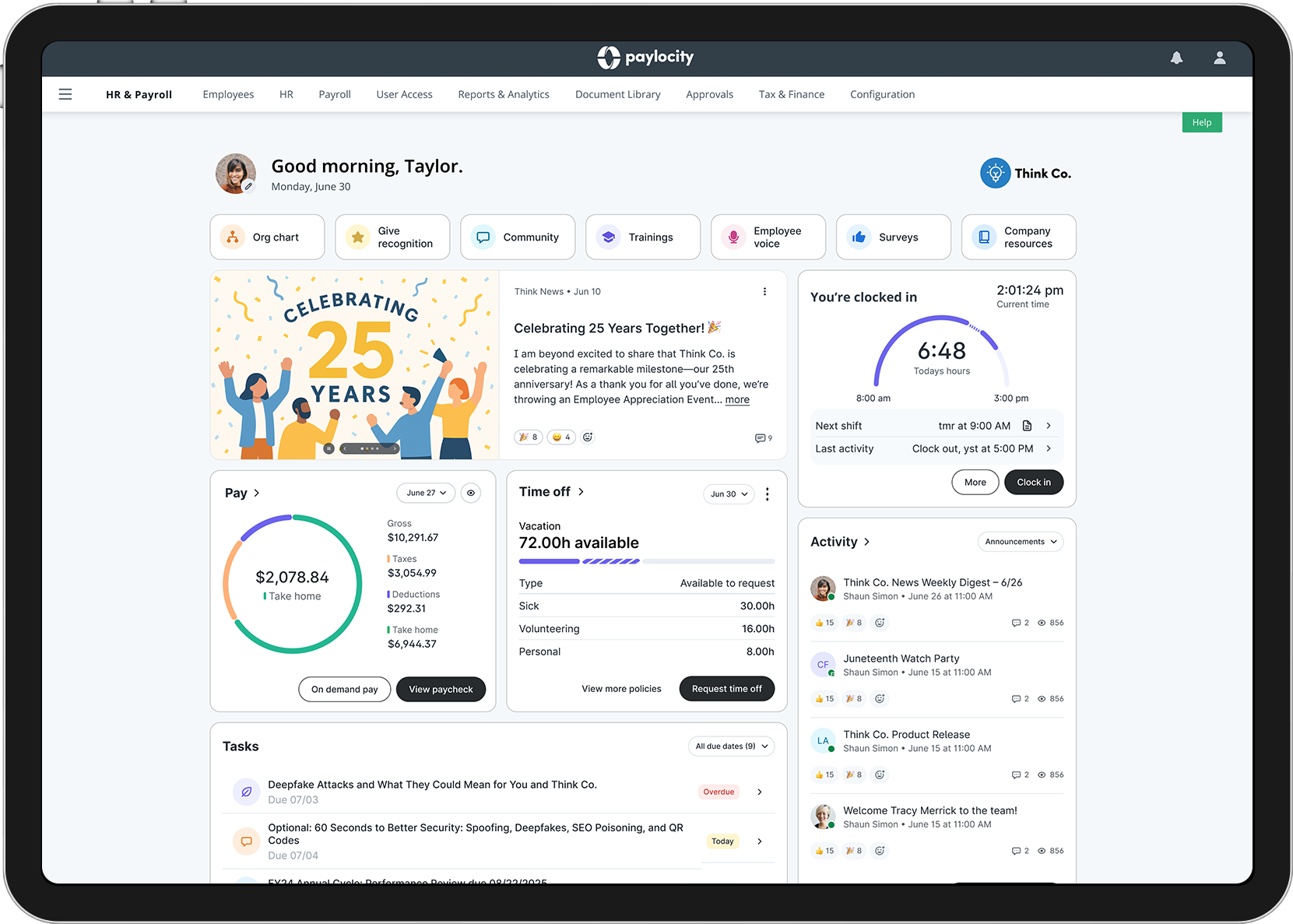
- Undisclosed pricing.
- It doesn’t have a free trial or free plan.
- Support is available in English only.
- It isn’t the best solution for remote teams looking for a tool to manage payroll and benefits for their contractors.
Paylocity simplifies the management of employees, documents, and processes. One of the key strengths of their HR software is the ability to streamline information collection and task completion across various users and workspaces. Whether it's confirming employee addresses, collecting proof of certification, or managing employee onboarding, Paylocity makes it easy to automate and centralize these processes.
Midsize companies will appreciate Paylocity’s support for employee recruitment and retention. You can effectively manage your scaling workforce demands with an internal ATS that allows you to take bulk actions, such as mass text communications.
Their self-service and community modules also function as central hubs where employees can communicate and collaborate with coworkers, complete tasks, stay updated on company news, and access resources and pay stubs. I find this especially useful for wide-scale system adoption since employees don't need to be platform experts to access the information they need.
As for managers and HR professionals, they have full visibility into employee data at the position and seat level, can easily configure new positions, assign required skills and certifications, predict vacancies, and manage budget changes.
Paylocity also takes compliance seriously, with a dashboard that provides quick access to work authorizations, EEO and FLSA compliance data, and industry news. And if you need extra support, Paylocity's HR Edge service provides expert resources, including an account manager, to help you minimize risk and implement best practices.
Finally, you can use Paylocity's robust reporting and analytics capabilities to gain a deeper understanding of your workforce. With real-time, visualized data, you can monitor key metrics, identify trends, optimize your HR strategies, and drive business success.
Paylocity serves more than 41,000 companies, including the Lincoln Park Zoo, Scrub Daddy, and Buena Vista Business Services.
Although Paylocity does not disclose pricing, third-party sources indicate it ranges from $17 to $32 PEPM. Pricing depends on what modules you require from its HR, Finance, and IT suites.





Best For
Paylocity is best for medium- and large-sized companies that need support managing their growing teams and complex pay processes.

Paylocity is used for every aspect of the business and is the most complete HRIS for our needs:
- Easy, painless payroll that is automated and tax compliant.
- HR task automation.
- Recruiting and onboarding.
- Communication and collaboration, helping build a more connected and engaged culture.
- Operational efficiency - Time spent on administrative tasks is reduced, such as manual clocking, time-tracking, and costing out of labor rates.
- The Talent Acquisition module helps fill roles more quickly with top talent by leveraging modern tools like texting and QR scan codes.
- Cost-effective solutions for a variety of organizations, including education, financial services, healthcare, manufacturing, nonprofit, restaurants/hospitality, retail, and technology. Solutions are available for small, midsized, and large enterprise organizations. Paylocity streamlines HR tasks, minimizes compliance risk, and drives communication and collaboration with tools to improve employee engagement.
Since 2000, I have used Paylocity. Our previous HR systems were numerous. We moved the following processes into Paylocity, which offers an all-in-one HR solution:
- Payroll - Automated processes, tax compliance, and overall simplification of payroll processing.
- Workforce Management - Improved efficiency by automating scheduling, time tracking, and ease of use for employees via their phones.
- Human Resources Software - Automation of manual tasks such as reviewing time management and I-9 Work Authorization tracking. Simplification and access to real-time information via the mobile app allow everyone to view their pay info, tax forms, time off requests, update personal information, and complete tasks that previously required paper.
- Talent Management - This tool helps shorten the time to hire during the recruiting cycle, expands the reach of finding top talent by posting and sharing openings across many job boards, and enhances the candidate experience through texts and QR code scanning.
This aids in finding talent faster and making engagement easier. Additionally, this module is excellent for onboarding new employees by eliminating hours of onboarding paperwork, as every aspect of onboarding is done online through Paylocity.
There is a performance management segment that provides employees with the tools they need for career development and conducting reviews. Also within this module, compensation and a Learning Management System (LMS) are robust and automated, with a wealth of tools built in to help with employee engagement and retention.
- Benefits - We moved from manual to automated processes, reducing confusion through simplified, flexible benefits management and employee usage. Key takeaways: access anywhere via mobile or desktop, real-time information, employee education with step-by-step guidance videos/scripts, compliance with federal and state regulations for COBRA, ACA, and HIPAA, and ease of error reduction through automation.
- Employee Experience - Employees have access to the HR platform, increasing self-service adoption, building confidence, collaboration, and connection.
- Data - Paylocity helps bring data to life while keeping in tune and up-to-date with your workforce. For example, AI is used to provide key insights for identifying gaps and actionable recommendations on how to improve employee productivity and reduce turnover.
I do not have any cons to share about Paylocity.
In comparison to Workday, the ease of implementation and support was better with Paylocity. When I used Workday with a large enterprise organization supporting 10,000 employees, the assigned team was larger and divided into various segments. Paylocity supported a small service organization with fewer than 2,500 employees.
The criteria should include the following:
- The available budget.
- Types of systems and applications being integrated.
- Company size.
- Readiness to move away from paper and files into software/automation. Paylocity simplifies and streamlines critical payroll and HR processes.
- Remember to allocate time and a team to help design the front end of the system and plan the rollout—this takes time and patience.
Paylocity has expanded and introduced the Modern Workforce Index (MWI), giving HR leaders real-time visibility into organizational health compared to similar companies based on NAICS codes and organization size.
Paylocity is primarily designed for small to medium-sized organizations. It simplifies and streamlines critical payroll and HR processes and functions.
Larger enterprise organizations won’t find Paylocity dynamic enough for their needs.
BambooHR
BambooHR has been a go-to HR solution for small- and medium-sized businesses (SMBs) for years, with modules covering nearly every HR process — from hiring to payroll, benefits, time tracking, and performance management. BambooHR stands out to me for its plug-and-play HR workflows, pre-built reports, and easily navigable interface that requires little training.
PROS
- Flexible pricing: Access volume and product bundling discounts as your needs grow, plus a 7-day free trial to start.
- Simple user interface: Updates to its user interface, including a new navigation side panel to improve module toggling, mean faster training and higher employee adoption rates.
- Global support: Employer of record (EOR) services powered by Remote allow you to hire and pay employees in more than 90 countries without leaving the BambooHR platform.
- Company branding: Update BambooHR’s interface colors and logos to align with your company’s branding guidelines and enhance your professional appearance.
- Flexible packaging and custom pricing is the way they roll. You can pick out one or two packages and pick other modules as add-ons based on your needs.
- Very simple and straightforward tool, easy to use.
CONS
- Limited support times: Customer support is only available between 6 AM and 6 PM MT Monday–Friday.
- Critical functions reserved as add-ons: Critical HR functions, including U.S. payroll, benefits administration, and time-tracking, are only available as add-on modules.
- Reliance on partnerships: HR compliance, EOR, and training are handled through third-party integrations rather than native features, potentially creating a disjointed user experience.
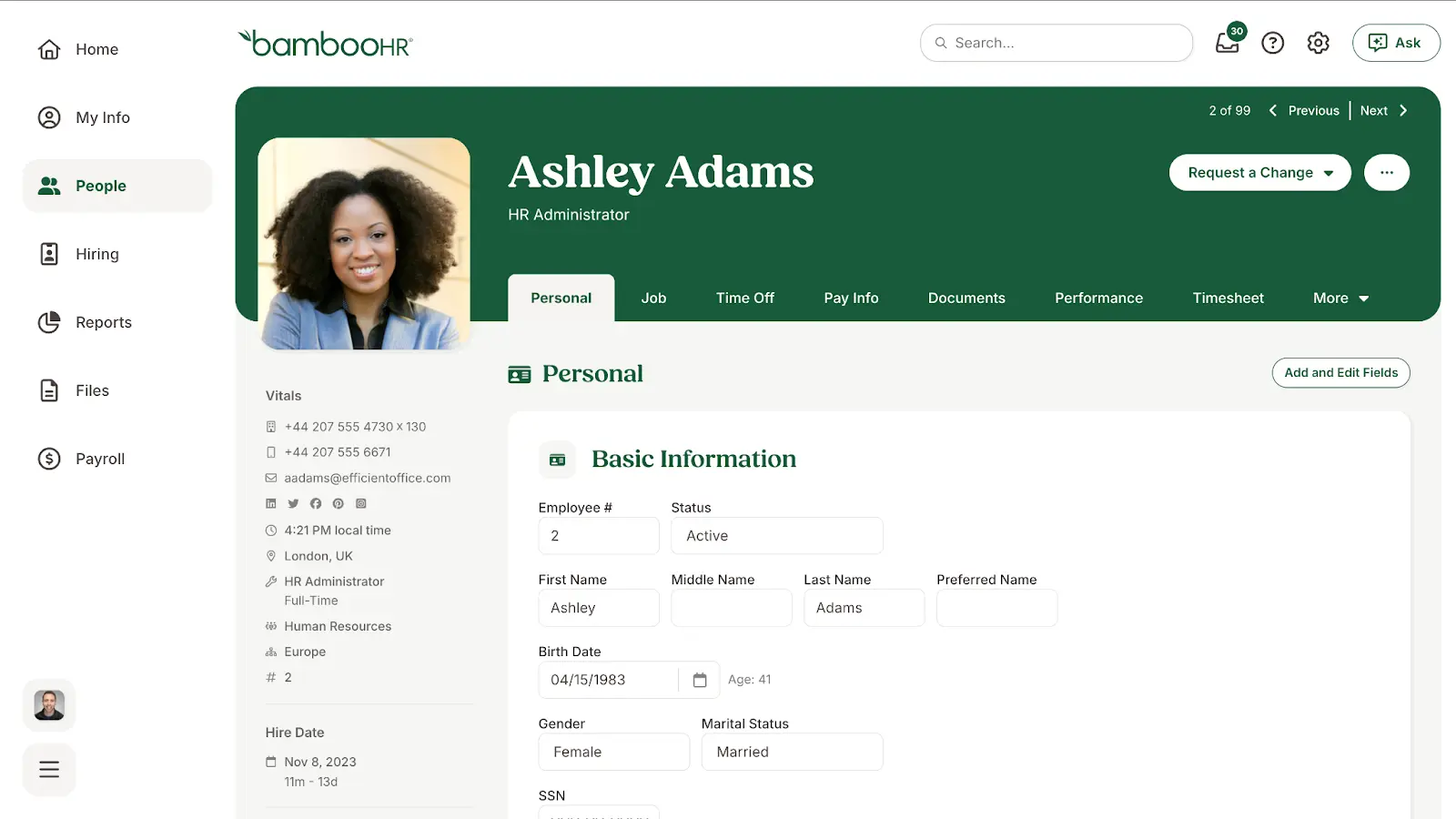
- Payroll is only available for US-based employees
- Customer support is only offered during US business hours.
- Some modules like time tracking, performance management, and surveys are only available as add-ons.
BambooHR has made it to my shortlist for many years for its simple interface, modules that support the entire employee lifecycle, and easy-to-build HR workflows.
Aside from core HR functions like an applicant tracking system (ATS), leave management, employee records, and a company calendar, they also have performance management, benefits administration, and payroll available as add-ons. But what I particularly like about BambooHR is that it continues to innovate on these core HR functions while keeping its SMB user base in mind.
For example, within the last year, it underwent a major interface overhaul with the addition of a left-side navigation menu, similar to other HR platforms like Rippling and Gusto. This makes it even easier for new users to learn the platform as it mimics popular social media platforms — especially helpful if you struggle with platform adoption among your employees.
They also added a new AI assistant, EOR services, and compensation benchmarking in 2025. While I like the new AI assistant for quick access to data and policy insights with source citations, BambooHR's in-app HR benchmarks are particularly exciting and a novelty for small-business-focused HR platforms.
With them, I can compare compensation, turnover, and eNPS against peers by company size, industry, and location. This helps me make strategic decisions like addressing pay equity gaps or improving onboarding when turnover spikes, without relying on third-party sources like SHRM or the Bureau of Labor Statistics. Only ADP in my shortlist offers similar benchmarking capabilities.
But BambooHR does have its flaws. For one, its benchmarks are based on the anonymized data of its 34,000+ customers, a far cry from ADP's more than 1.1 million customers, making them less accurate overall.
For another, creating your own workflows, such as new hire onboarding, continues to use a guided walkthrough. This is perfect for HR software newbies but can be frustrating for companies that want more advanced customization, like initiating tasks through integrated apps like Slack. If you need that workflow configurability, look to Rippling or monday.com instead.
BambooHR has 34,000+ customers, including names like MasterClass, Bitcoin.com, and ZipRecruiter.
BambooHR offers three per-employee, per-month plans: Core ($10) for core HR features like employee records, hiring, time off tracking, and compliance tools; Pro ($17), which adds performance management and employee engagement features; and Elite ($25), which includes compensation management, advanced analytics, HR benchmarks, and premium services. Volume and nonprofit discounts are available.
BambooHR also offers add-ons such as Time Tracking, Payroll, and Benefits Administration (US only), as well as Employer of Record services via Remote. A 15% bundle discount applies to Payroll and Benefits Administration for US-based employees only.
Note: BambooHR’s 7-day free trial allows you to try everything in its Elite plan, plus its Benefits Administration add-on. If you’d like to see their time-tracking, payroll, and EOR add-ons in action, you can request a free demo.





Best For
BambooHR is best for US-based SMBs looking for pre-built HR workflows and dynamic pricing. The platform is also quite popular among teams that are partially or even fully remote.

We use BambooHR every day. I use it to process payroll, make changes to employee profiles (personal and employment information), and review timesheets and time-off requests. Our employees use it to clock their hours, check their pay stubs, and request time off. We also use BambooHR for hiring purposes, though not on a weekly basis.

- It has a modern, user-friendly interface that is very intuitive.
- Every section of BambooHR is customizable.
- It consolidates payroll, HR, benefits, and performance management in one place.
We were using Heartland Payroll Solutions when I joined the team, which was a terrible platform. BambooHR came highly recommended by our new CRO at the time, who had used it before. We wanted a more user-friendly system for both administrators and employees that would also allow us to pay contractors and process all company benefit packages. We also liked that BambooHR offers hiring and performance review options.
- It doesn't allow you to add a fixed semi-monthly amount for contractors who are not charging hourly rates, requiring you to create an hourly rate and manually adjust hours when running payroll.
- We've had minor issues with pay periods when a weekend and holiday fall together, causing the system to prompt us to run payroll before the pay period has ended. While there are workarounds, it's stressful and inconvenient.
- Employees have reported that the time-tracking feature on the BambooHR app doesn't always work correctly, requiring me to adjust their hours. I have brought this to BambooHR's attention, but since it doesn't seem to be a widespread issue, it may be user error on our employees' part.
I have some minimal experience with Gusto, which I liked well enough. However, compared to our previous payroll provider (Heartland Solutions), the difference is night and day. Heartland was slow, not user-friendly, and had very few integrations. Everyone in our company was happy when we switched to BambooHR. It has definitely made my job as an HR manager much easier.
Consider your main goals. I think BambooHR is reasonably priced for what it offers. The yearly cost is based on a variable monthly fee that depends on the number of employees, whether they use time tracking, etc. It usually amounts to $216 per month.
BambooHR also offers many add-ons that can increase the subscription cost, such as a Slack-style platform and a Community feature, which we do not use.
I recommend discussing pricing and features with the platform representatives to ensure it aligns with your budget. Also, consider the other services and benefits you offer and whether you want them integrated into your HR platform. BambooHR is designed to be an all-in-one HR solution.
We have only been using it for 1.5 years, but they are constantly adding new features. They also send out frequent newsletters with downloadable HR guides.
We are a relatively small startup (<50 employees), so I’m not sure how BambooHR would work for a very large organization. It is well-suited for dynamic, tech-forward companies, as it requires some customization on the user's end. It feels very much like a Millennial/Gen Z platform.
Perhaps a large corporate organization, though I can’t say for certain. BambooHR is not a very formal platform in its approach or language. Certain sectors of the corporate world may find it too informal, dynamic, or playful.
.png)
Deel
.png)
Deel provides some of the most comprehensive feature sets for global systems on the market. Besides in-house and EOR global payroll, they also offer international entity setup, visa and immigration services, and contractor payroll and engagement tools to support your company's business goals worldwide. While I don't find Deel as easy to navigate or set up as competitors like Oyster, their breadth of features and more affordable pricing make them the best overall option for global businesses. They're also flexible enough to support both small companies (with their $5 PEPM HRIS option) and enterprises (pay employees in-house in more than 130 countries), meaning they can grow with you.
PROS
- Free global business tools: Access free global tools like misclassification quizzes, employee cost calculators, and hiring guides to plan for international expansion at no additional cost.
- White-labeling: Personalize Deel's interface to your brand and scale your services worldwide without building the software from scratch.
- 24/7 technical support availability: Resolve technical issues directly within Deel, regardless of time or location.
- Excellent 24/7 customer service with fast onboarding (2-3 days) and local payroll experts in each jurisdiction.
- Seamless integration with platforms like QuickBooks, BambooHR, and Greenhouse, plus custom integration options.
- User-friendly, self-service features enable quick setup; identity verification often takes under 24 hours.
- Automated invoices simplify payments, provided they're in English.
CONS
- Limited language support: Tech support is only available in English.
- Difficult-to-navigate UI: Finding where to access or configure features, such as time-tracking settings, makes workflow setup and completion take longer than necessary.
- Additional costs for Deel Engage: Access to modules such as performance management, learning management, career management, and surveys requires an extra $20 PEPM.
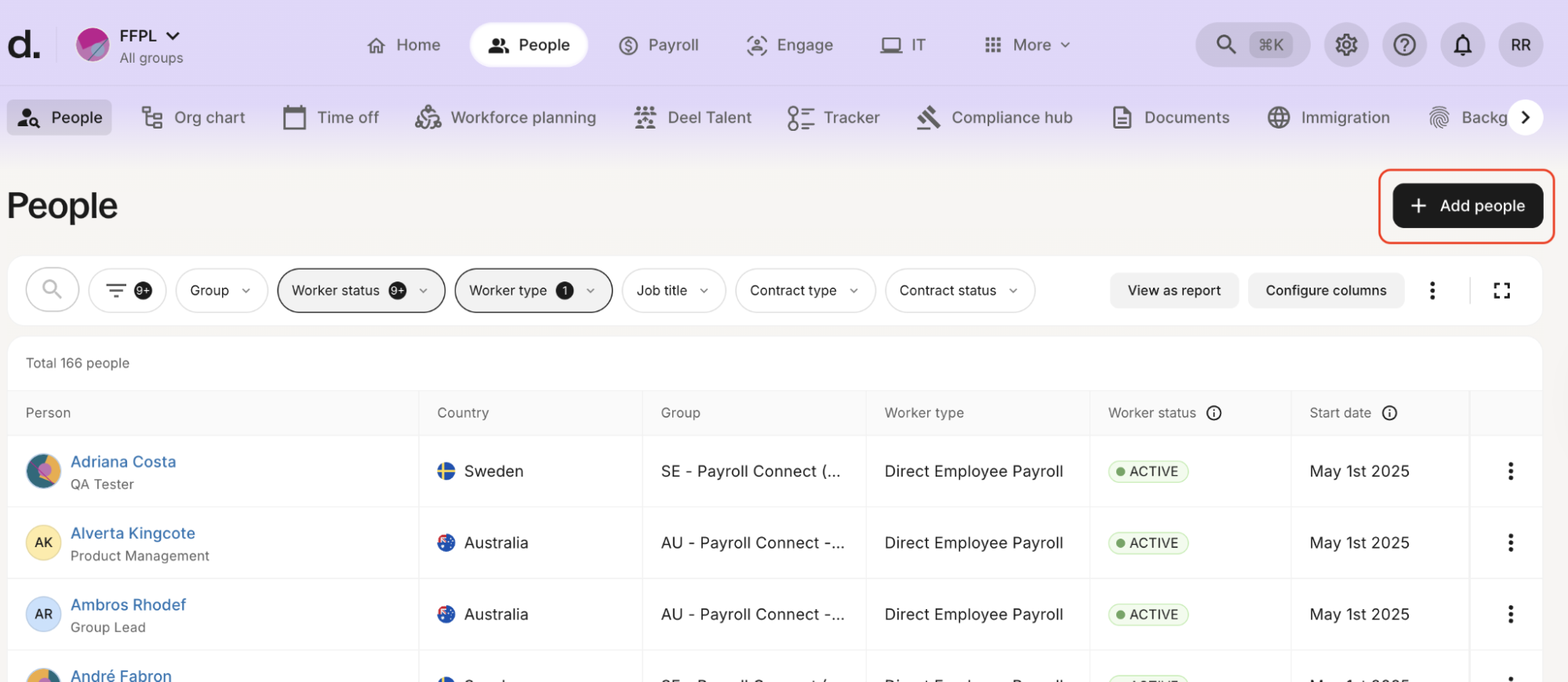
- Key features like onboarding automation are add-ons, which may increase costs.
- Limited flexibility in modifying contracts or service agreements; changes often require an addendum.
- Invoices cannot be generated in languages other than English.
I added Deel to this page for their global focus and simplicity. The majority of their features are geared toward small and mid-market companies just entering the international space. Their core platform, Deel HRIS, serves as the hub for all of their HR processes, with the option to add global payroll functionality.
This is actually relatively new. In my previous Deel demos, they used separate interfaces to manage HR processes and EOR payroll, which made it a pain to toggle between the two. This was because Deel's EOR came before their HR platform release, but as they continued to add more HR-focused features, the interface consolidated into a global HR & payroll hub.
Today, Deel still shines the brightest when it comes to managing a distributed team. Their new compensation module provides salary data from 150+ countries to create fair and competitive wage ranges for global employees. The IT module lets you send remote workers office equipment worldwide, including managing device returns and resets for offboarding. And they even offer unique support for contingent workforces, like more than 15 flexible payment options (including cryptocurrency).
All of this makes managing international teams significantly easier than piecing together multiple vendors. That said, Deel has room to grow to rival competitors like Rippling for process automation or Bob for employee experience. But they remain the ideal platform for global, smaller, and cost-conscious companies looking to establish or expand their international presence.
Deel serves 37,000+ companies, including Instacart, Shopify, Reddit, and Jelly Belly.
Deel offers multiple HR products and services to choose from, such as:
- Deel EOR: Starting at $599 PEPM.
- Deel Contractor Management: Starting at $49 per contractor per month.
- Deel Contractor of Record: Starting at $325 per contractor per month.
- Deel Global Payroll: Starting at $29 PEPM.
- Deel Engage: $20 PEPM.
- Deel Compensation: Up to $15 PEPM.
- Deel Workforce Planning: Up to $18 PEPM.
- Deel HRIS: Starting at $5 PEPM.
- Deel IT: $10 per person per month.
There are also several products where you’ll need to call sales for a custom quote, including U.S. payroll, immigration support, and background checks.





Best For
Deel HR is best for remote-first companies that have global payroll needs.

Deel is a crucial tool for payroll systems. As a payroll admin, you would use it almost daily to optimize payroll operations, manage payroll structures, and handle Employer of Record (EoR) services.
Some organizations opt for additional compliance support or custom reporting features. Deel workflows also include employee onboarding, offer letter generation, document collection for compliance, and payroll-related benefits administration.
- Deel is an excellent solution for organizations with international contractors, offering a smooth and simplified process.
- It provides EoR services in over 150 countries and includes additional features like onboarding and time-off tracking for international contractors.
I worked with a company expanding into two international markets as part of a tech stack selection project. My engagement lasted about six months and involved selection, implementation, and change management for onboarding.
Deel is a global payroll solution designed to streamline compensation operations for organizations. The company needed a system to manage international payroll efficiently while ensuring compliance across different regions.
- Deel is only worthwhile if you fit its niche. It can be expensive, and if you don’t have a high volume of international hires, the cost may not be justified.
- If you need a more streamlined international hiring process with lower volume, alternatives like Oyster, Remote, or Papaya may be better options.
- Customer support is lacking.
Deel is uniquely positioned to expedite international hiring, particularly for contractors, seasonal hires, or high-turnover roles. It outperforms most competitors in this area for the price. However, if your needs don’t align with this niche, Deel may not be the best choice.
- What does your international hiring strategy look like, and what types of employees are you hiring?
- What is your budget?
- What HRIS features do you need?
Deel’s primary strength is its extensive EoR services, which have expanded to meet user demand. The company has focused on increasing its EoR coverage in new countries to strengthen its niche. Additional onboarding and benefits features support this strategy, but overall, Deel has not evolved significantly beyond its core offering.
- Companies with high-volume international hiring can benefit from Deel, particularly for contractors or high-turnover roles.
- Organizations managing extensive international payroll and compliance requirements.
- Employers needing to sponsor immigration visas.
- Companies that do not hire internationally don’t need Deel.
- Organizations prioritizing integrated HRIS features or complex HR operations.
- Honestly, most organizations.

HiBob

Bob is a global HR software platform that provides customizable features to streamline HR processes, including advanced functions such as compensation and workforce planning. But Bob particularly stands out for its focus on employee experience — from its funky, colorful interface reminiscent of 1970s disco, to employee recognition and interest groups that foster workplace connection. Bob is well-suited for most SMBs, but if your goal is to manage HR processes and improve platform adoption and engagement with employees, I recommend Bob. It's both fun to use and a powerful tool to manage people processes.
PROS
- U.S. and UK payroll support: Process payroll for U.S. and UK employees directly within Bob, without a third-party integration.
- Intranet features: Post announcements, welcome new hires, and celebrate employee wins from Bob’s homepage.
- HR ticketing: Allow employees to anonymously report issues and monitor case status, ensuring employees feel safe reporting workplace concerns.
- Predictive analytics: Leverage data like tenure, team turnover, and career development to determine staff at risk of attrition and take proactive measures.
- They have tons of modules, which makes them a real one-stop shop. Beyond Core HR, they have modules for most things People Ops-related.
- Bob is a fast-growing company and their product looks the part, as it has one of the sleekest-looking platforms in the HRMS space right now.
- Their payroll hub allows you to connect all your payroll systems, which works great if you want to pay people in multiple locations without switching providers.
CONS
- Limited customer service options: Support is only available via chatbot and email.
- Undisclosed pricing: Must contact sales for a custom quote.
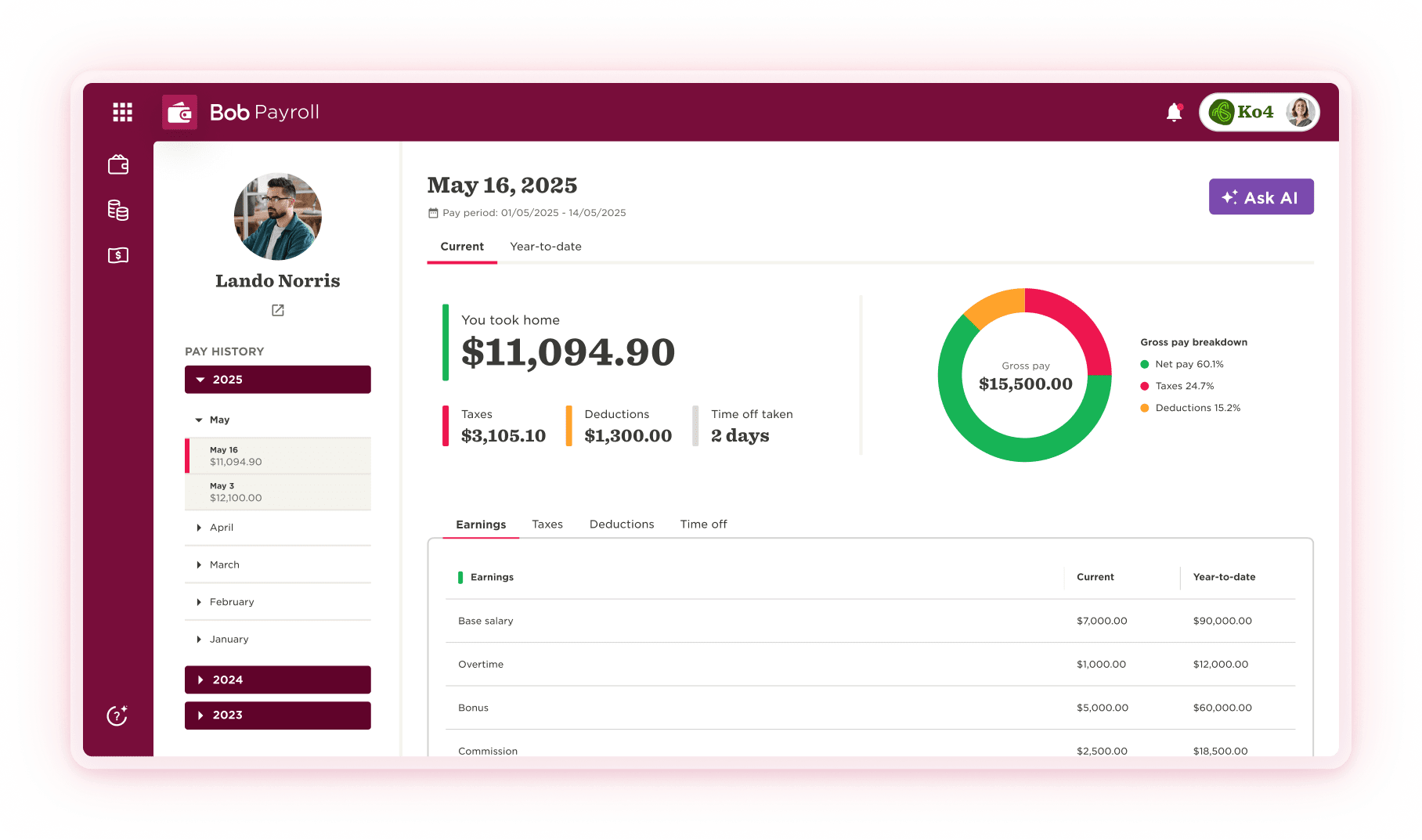
- Customer support is only offered via a chatbot and email.
- As to implementation, several users commented that they felt there could be more attention via personal walkthroughs provided at the beginning. Many had to resort to reading documentation and watching videos or just figuring things out by themselves.
- Pricing is only custom and available upon request, so you can’t just sign up, pay, and start using the tool.
HiBob is an interesting contender in the HR software space. Its philosophy is to put the employee first, and you can see that in how easy its HR platform, Bob, is to use. For example, I can send "kudos" to staff directly from Bob's homepage. Bob’s default settings also let employees customize their public profiles to showcase their gender pronouns, hobbies, and "superpowers."
But one of my favorite features, which I haven't seen any other HR software system emulate, is the “Club View” function on organization charts. With it, I can sort employees by their hobbies or interests, making it easier to connect with like-minded peers. This is great for global or remote teams where direct engagement with coworkers is challenging.
Forward-thinking HR departments interested in improving employee experience will like Bob. It offers essential tools, including onboarding, time-tracking, payroll, time-off management, surveys, benefits administration, and performance management.
HiBob has more than 4,400 customers worldwide, including SmartRecruiters, Fiverr, and VaynerMedia.
HiBob does not disclose Bob’s pricing — contact its sales team for a custom quote.





Best For
Bob is best suited for SMBs, especially those with multinational or remote teams.

We use Bob everyday. It is an integral part of our business. The key workflows we use Bob for are hiring, onboarding, offboarding, internal mobility, employee engagement and assigning tasks.
As a startup company, I love the ability to automate my daily HR administrative tasks. I’m very impressed with the onboarding capabilities for both in office and remote hires. In addition, the ATS integration with Workable is great to streamline hiring.
We were introduced to HiBOB at an HR Technology convention. We were seeking software to automate our hiring workflow process. Bob allowed us to create customized workflows, and implement e-signature documents which drastically improved our onboarding process. Bob also was very useful in helping our HR team with our company reorganization.
It would be nice if Bob had its own ATS to eliminate the requirement for third-party software.
Bob is different from its competitors for several reasons. I find the user interface and experience to be more desirable than a few other platforms. Bob is easy to navigate and has the ability to customize my dashboard. Most importantly our new hires love the straightforward modern onboarding process.
The first thing people should look for is to determine if the tool aligns with your company needs and goals. People should also make sure the tool integrates with their existing tools i.e. ATS. The next feature to consider is the cost per employee. An ideal tool will offer reduced rates as your employee/user headcount increases.
Bob has evolved overtime to meet the new HR landscape and policies surrounding things such as the use of Ai. They continuously provide monthly newsletters with additional templates and tips for HR professionals. Bob also introduced a DEI dashboard.
Small to medium
Larger companies

ADP

If you're growing and need flexible support for unique business cases, ADP's Workforce Now HR software is a worthy consideration. It offers the largest selection of native solutions to handle the evolving needs of midsize businesses, including global payroll in more than 140 countries, benchmarks for strategic workforce planning, and even business advisory services. ADP also has one of the largest integration libraries on the HR software market, allowing you to connect accounting, business intelligence, and collaboration tools for a centralized system to handle all your people processes as you grow.
PROS
- Enormous product library: From HRIS/HCM/HRMS suites to global payroll, data analytics, contractor management, and financial wellness tools, you can support nearly all people functions from one vendor.
- Advanced reporting and analytics: Access benchmarking data and AI-powered narrative insights to pinpoint trends and make data-informed decisions on people processes like turnover and headcount planning.
- HR outsourcing: Offers PEO services or managed services, like payroll and benefits, to offload specific HR functions until you can support these internally.
- ADP Assist: Access ADP's AI assistant to have natural-language conversations to speed up platform navigation, report creation, and payroll processing, plus automate repetitive tasks.
- Native, all-in-one technology suite for recruitment, payroll, and compliance.
- 17 RPO service centers in 14 countries and provide services in 42 different languages.
- Dedicated team of AIRS-certified recruiting professionals.
CONS
- Legacy system: ADP Workforce Now's system is a combination of acquired businesses and ongoing updates to legacy software features, making some workflows feel dated compared to newer platforms.
- Requires customization and training: You'll need walkthroughs of the system with ADP experts, plus workflow setup and customization, for your business workflows to run smoothly.
- Hidden fees: ADP's fees add up, with costs based on your business size and the number of payrolls you run each month, plus additional fees according to your payroll tax and reporting needs.
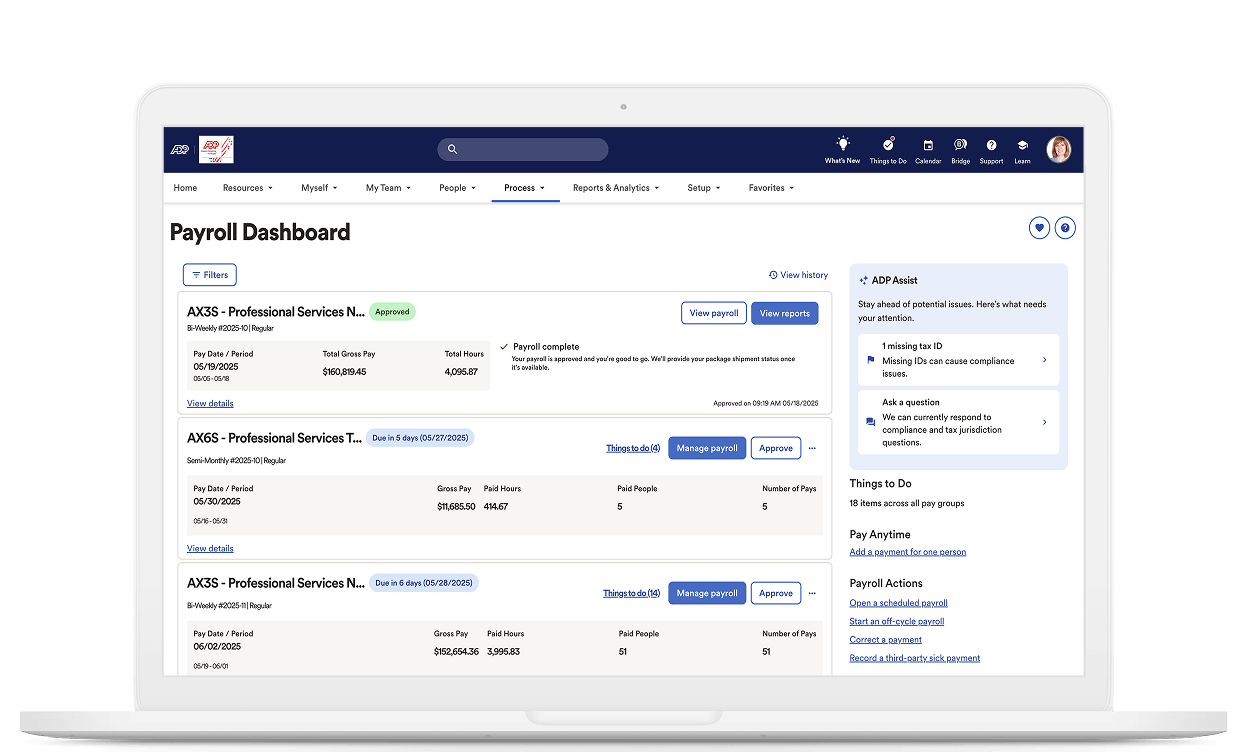
- Technology options outside ADP’s dedicated HR tools are limited.
ADP is an HR software vendor with more than 75 years of experience in HR solutions. It has a significant foothold on the U.S. HR software market, processing payroll for more than 42 million Americans. This means that, even if you’ve never used ADP, you likely know somebody who has.
As ADP’s mid-market option, ADP Workforce Now (ADP WFN) provides a balance of both pre-built and configurable HR workflows. It especially shines in the payroll department, allowing me to tackle complex payroll cadences, like multiple pay schedules and off-cycle pay runs, from the same screen. It even supports fluctuating workweeks, certified payroll, and employees with multiple pay rates.
I like ADP WFN's interface from the employee perspective, especially its mobile app. The ability to complete preboarding tasks from your phone, including taking and uploading pictures of I-9 documents and voided checks for direct deposits, eliminates the extra step of transferring images during desktop onboarding; a huge time saver.
Despite this, after multiple walkthroughs, I still find the admin interface busy and unintuitive. There's a lot of scrolling to access various features, such as reports on its HR dashboard page. Starting the onboarding or termination workflows for an employee requires more than two clicks, unlike the one-click buttons in Rippling's navigation pane.
Most of this stems from legacy functionality that ADP continues to upgrade and modernize. Its 2025 interface makeover offers a more accessible design with prominent buttons and contrasting colors, plus it adds its AI copilot, ADP Assist. With it, I can complete HR tasks, like building a report, within a natural conversation — a win if you need scalable, advanced customizations while retaining the ease of use of platforms like BambooHR.
ADP WFN’s primary market is small- to midsize businesses, with customers such as Four Seasons, Logicalis, and Smoothie King.
ADP WFN doesn’t disclose its pricing. You’ll need to contact its sales team for a custom quote. The quote depends on several factors, including the frequency of your payroll (weekly, biweekly, semi-monthly), number of employees, worker types (employees, contractors), subscription tier, add-ons, and support level.
You can choose from the following subscription tiers and add-ons:
- Select: Payroll, tax, HR tools, ADP Assist, Voice of the Employee, onboarding, digital recordkeeping.
- Plus: Everything in Select and benefits administration.
- Premium: Everything in Plus and workforce management.
- Add-ons: Talent acquisition, performance management, compensation management, HR assist, enhanced analytics, and learning management.





Best For
ADP Workforce Now is best for scaling mid- to large-sized companies operating out of the U.S.

OnPay

OnPay is the most affordable platform on our shortlist, with a one-size-fits-all pricing model and no additional implementation or data migration fees. Their $49 + $6 PEPM price even includes multi-state payroll support, which rivals Gusto’s starter subscription plan. I also like that OnPay focuses primarily on small-business HR needs, providing federal, state, and local tax compliance, along with simple reports and an internal human resources information system (HRIS) for managing performance reviews, employee rosters, and internal communications.
PROS
- Small business HR tools included: Access e-signature, customizable offer letters, I-9 and W-4 forms, legal templates, and multi-state payroll support — all in the base price.
- Specialized industry payroll support: Handles unique payroll needs for some industries, like nonprofits (501(c)(3) tax exemptions) and religious organizations (clergy tax exemptions).
- Support for multiple worker types: Pay workers in the same payroll run, whether they are employees or contractors, or whether they work remotely or on-site.
- Free tax form handling for W-2 employees and 1099 contractors.
- Some HR services included within the plan at no additional cost.
- 30-day free trial available (starts after OnPay verification).
- Well-developed online help resources.
CONS
- No native accounting or time-tracking: You must integrate with third-party platforms like QuickBooks Online, Xero, When I Work, or Deputy for these functions.
- Limited scalability: The fixed feature set means you'll need to migrate to a new platform once you outgrow OnPay's capabilities, such as paying international employees or contractors.
- Lacks advanced HR tools: Without AI assistants, automated payroll, and configurable reports, OnPay requires more manual data entry or third-party apps to automate complex processes.
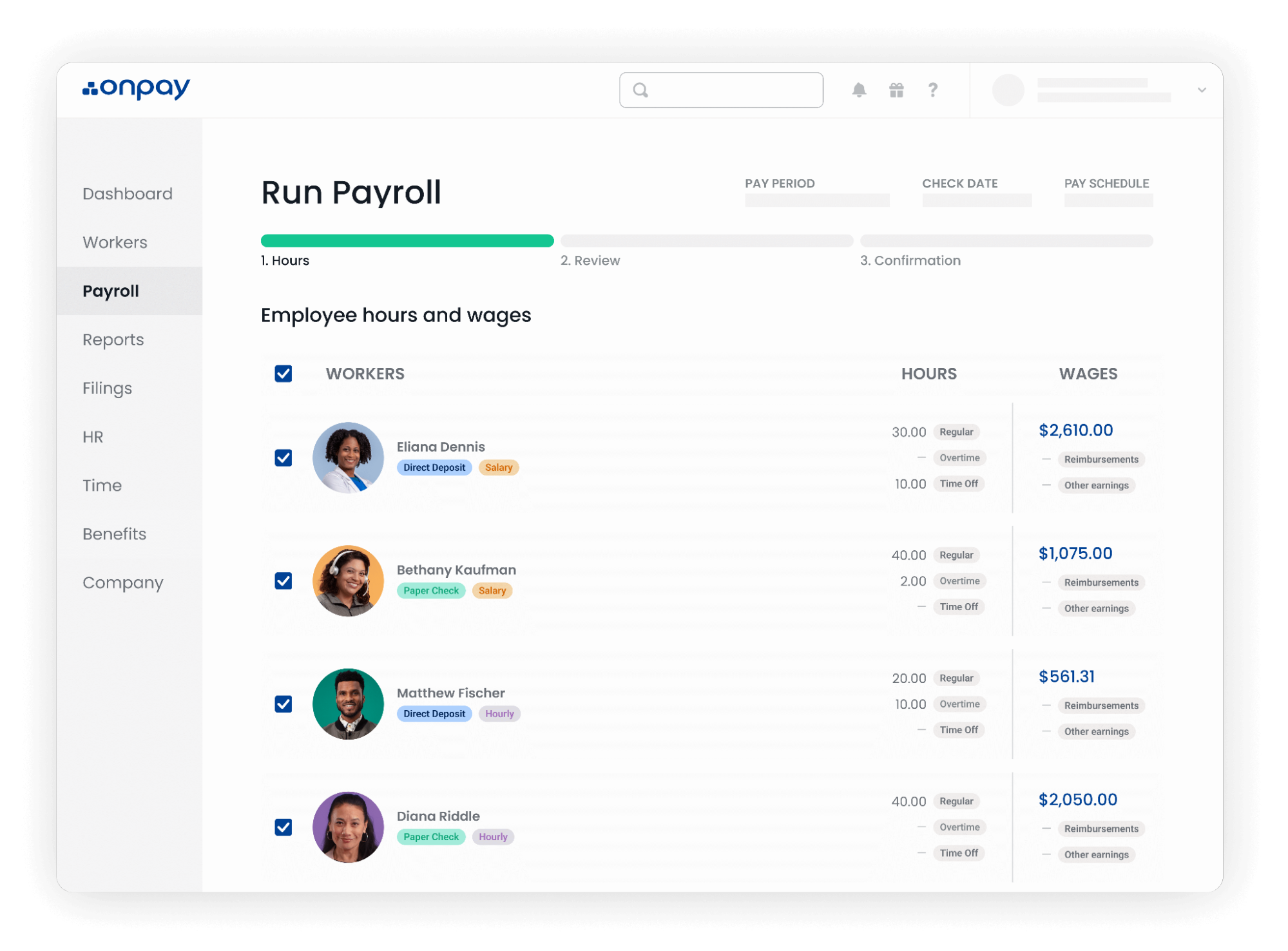
- Poor functioned employee mobile app.
- Requires payment four days before payday for direct deposit.
- Doesn’t support automatic payroll.
- Customer support sometimes hard to reach.
OnPay is an excellent first-time HR software system for small businesses. It covers core HR processes, such as payroll and benefits, at simple, affordable pricing.
The standout features for me are its compensation and benefits management capabilities. You don't have to calculate state and federal taxes and withholdings; the platform will do it automatically in compliance with regulations.
I also didn’t encounter any issues during testing of OnPay’s payroll features. But even if I had, their tax accuracy guarantee means they’ll work with the tax agency and cover any penalties or fees to resolve the issue.
As for benefits tools, the platform is an excellent licensed health insurance broker and can help you select the right plans in all 50 states. I noticed some well-known names, such as Vestwell and Guideline, listed as OnPay's 401(k) providers if you need retirement benefits for your employees.
OnPay's HR features include e-signature, offer letter sending, customizable checklists, PTO management, and self-onboarding.. While this is a great pick for very small businesses, I wouldn’t recommend OnPay for companies with more than 100 employees. It will likely become too labor-intensive to maintain — even if they do market themselves as being able to manage more than 500 employees.
OnPay does not publicly disclose how many clients they have.
OnPay uses a unique “one-price-fits-all” model. All customers pay $49 plus $6 PEPM. They also offer a free, one-month trial.





Best For
OnPay is best for small businesses that need affordable HR software to handle essential HR, payroll, and benefits functions. It is especially helpful for agriculture businesses, churches, clergy, and nonprofits because of its special payroll services.

We use Onpay weekly for our payroll runs, and it's become an essential part of our routine. The key workflows we rely on include calculating and processing employee salaries, handling automated tax filings, and managing direct deposits. This is challenging for us because we have employees on several different types of contracts. Onpay’s benefits administration feature simplifies enrollment and tracking for our team. It also keeps all our employee records up-to-date and compliant, ensuring everyone gets paid accurately and on time. We've also minimized payroll complaints from staff, which is a significant improvement.
- Super Simple: Onpay is easy to use, even for someone who’s not a payroll expert.
- Tax Magic: It takes care of all our tax filings automatically, saving us a lot of time.
- Great Value: For what it offers, the price is excellent, especially for a smaller team like ours.
We bought Onpay because our previous payroll system was outdated, causing delays and errors that made payroll days difficult. We needed something reliable and easy to use, especially for our small team. Onpay met all our requirements with its straightforward interface, automated tax filings, and affordable pricing. It also integrates well with benefits and handles employee onboarding efficiently. I've been using Onpay for about a year now, and it has significantly reduced our administrative workload.
- Limited Customization: I wish there were more options to customize reports and dashboards.
- Customer Support: The support can be slow at times, which is frustrating when you need quick assistance.
- Advanced Features: It lacks some advanced features that larger businesses might need, making it feel a bit basic for more complex needs.
Onpay stands out with its straightforward, user-friendly interface and great value for money. Unlike some other tools I've tried, it's incredibly easy to navigate and doesn’t overwhelm with unnecessary features. I appreciate that it automates tax filings, which many other tools don't do as effectively. While it might lack some advanced options that larger businesses may need, for a small team, it offers the right balance of functionality and simplicity at a great price.
- Ease of Use: Choose a tool that is easy to navigate, so you’re not stuck figuring out complex menus.
- Automation: Ensure it handles tax tasks and direct deposits automatically to make payroll days stress-free.
- Support: Verify that the support team is helpful and quick to respond when needed.
- Cost: Make sure it fits your budget without sacrificing essential features.
Onpay has improved over time by keeping things simple and adding useful features. They have perfected automating tax filings and direct deposits, making payroll days easier. The interface has become increasingly user-friendly, which is a big plus.
It is ideal for small to mid-sized businesses that need a payroll system without extra complexity. It’s perfect for those who want an easy-to-use platform that handles all the payroll essentials, such as automated tax filings and direct deposits. If you’re running a business and want something straightforward and affordable without all the complicated features, Onpay is an excellent choice.
Onpay wouldn’t be a great fit for large organizations with complex payroll and HR needs. If you require advanced features, extensive customization, or robust integration with other sophisticated systems, Onpay might feel too basic.

Gusto

Gusto's small-business-friendly interface makes it especially approachable for startups and new businesses. It features step-by-step workflows to build strong HR habits and complete process-heavy tasks, such as payroll and performance reviews. I'm particularly impressed by how Gusto keeps its small-business customer base in mind as its product offerings expand. Instead of being weighed down by additional features (something I think many vendors occasionally struggle with) Gusto keeps simplicity its guiding principle. This means features complement rather than complicate its existing interface, so you can navigate new modules like scheduling without much training — a huge win for ease of use.
PROS
- Affordable, transparent pricing: Contractor-only plans start at $35 plus $6 per worker per month, while its Simple plan starts at $49 plus $6 PEPM — only OnPay in this round-up is cheaper.
- Gusto-brokered benefits: Gusto offers employee benefits such as medical, dental, and vision insurance at no additional cost beyond premium payments.
- Plug-and-play features: After guided platform implementation, complete processes like employee onboarding and payroll in a few clicks without lengthy set-ups.
- The dashboard feature keeps tabs on compliance tasks
- The hiring and onboarding sequence is nicely streamlined between HR and the new hire
- Post-offer, pre-start tasks are made easy with integrations like CorpNet (state tax set up) Checkr (background checks)
- Easy payroll for U.S.-based W-2 folks, domestic, and international contractors
- Person-to-person phone support, email, and other customer service resources
- The business model is responsive to customer needs
CONS
- Limited EOR country support: Currently supports paying employees in only 12 countries, including the United States, Canada, the United Kingdom, Australia, and select others.
- Limited customization options: Out-of-the-box workflows mean you must adjust processes to Gusto’s predefined ones; more complex pay, onboarding, and talent acquisition processes may require integration with third-party platforms.
- Basic reporting: Includes basic payroll and other workforce reports and graphs, but lacks advanced analytics tools, such as data visualizations and cross-module comparisons, for strategic workforce planning.
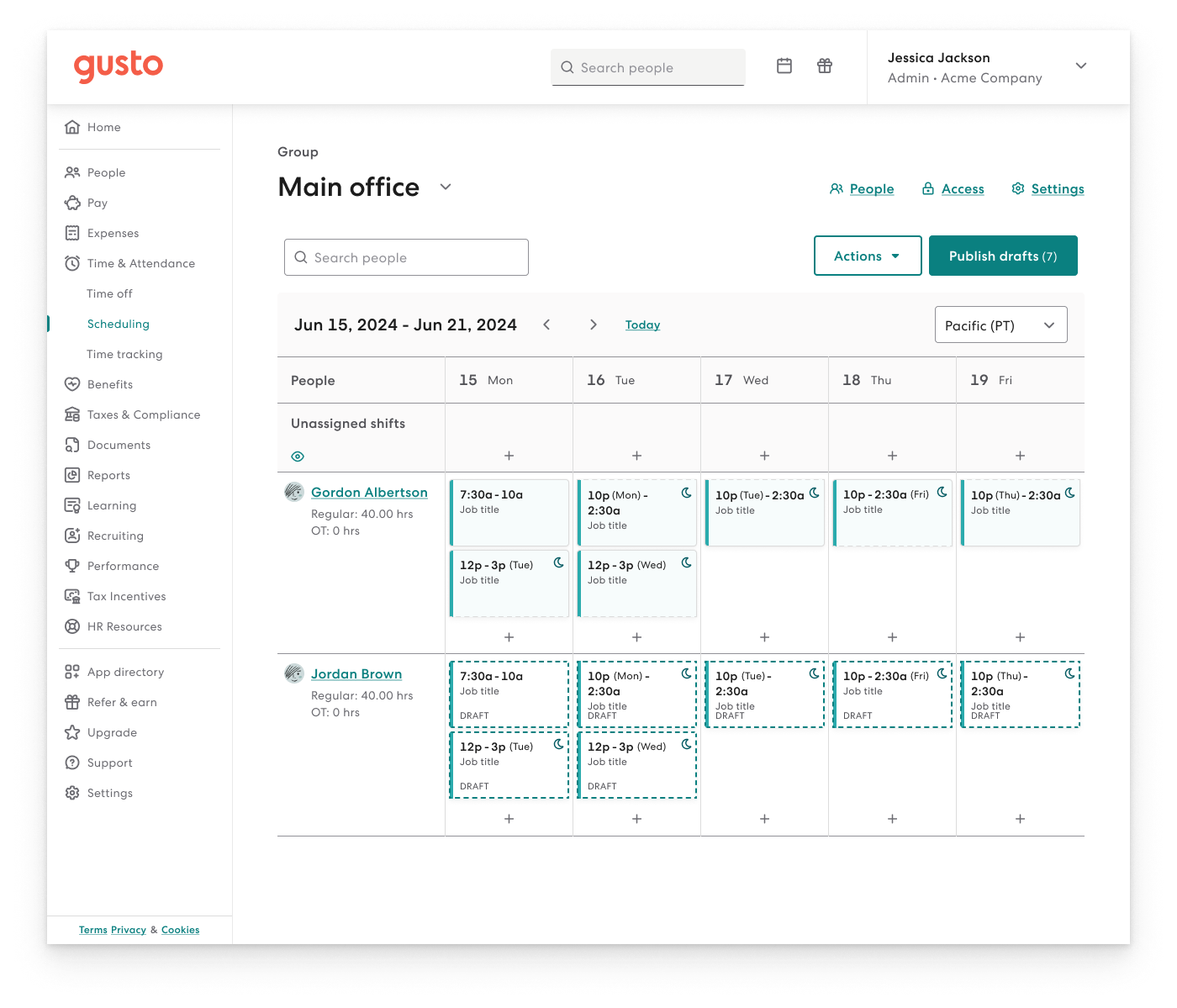
- Gusto can support payments for international contractors, but not employees
- No native accounting feature to keep earning and spending under the same roof
- Analytics dashboard is simplistic
Gusto began as a payroll-focused platform for small businesses but has evolved into an all-in-one HR solution supporting benefits, recruiting, performance management, and compliance training. With EOR services through its Remote partnership and money management features like invoicing and bill pay, startups can run most of their business operations in one place.
The platform walks you through payroll setup, helps you register your business in various states, and provides in-app assistance to resolve government notices. Features like Gusto-brokered benefits, labor law poster compliance, a solopreneur subscription plan, tax credits, and a payroll line of credit give you the right level of support regardless of your company's size or structure — critical when you don't yet have resources for a dedicated HR employee.
That said, Gusto likely won't be your long-term platform if your business grows beyond 300 employees. The system lacks the automations, analytics, and configuration options needed for complex processes like candidate relationship management, succession planning, and multi-entity management. You'll eventually need to graduate to more robust platforms like Paylocity or Rippling. But for startups and new companies expecting limited growth, Gusto is a stellar option to consider.
Gusto services about 400,000 companies, mostly small, local businesses in the U.S. Examples include Rise Marketing, Little Fish Accounting, and Arklign Laboratories.
Gusto offers three primary tiers: Simple, Plus, and Premium:
- Simple: $49 plus $6 PEPM; includes single-state payroll, PTO management, and employee database.
- Plus: $80 plus $12 PEPM; includes everything in Simple plus multi-state payroll and time tracking.
- Premium: $180 plus $22 PEPM; includes everything in Plus, plus performance and compensation management and priority support.
It also offers additional Contractor Only, Solopreneur, and EOR plans:
- Contractor Only: $35 plus $6 PEPM.*
- Solopreneur: $49 plus $6 PEPM; includes S Corp compliance features.
- Gusto Global: $699 PEPM.**
Gusto offers a host of other add-ons and services, including global contractor payments, same-day pay, and workers’ compensation plans.
* New contractor-only plan customers pay a discount rate of $0 plus $6 PEPM for the first 6 months.





Best For
Gusto is best for startups and new businesses with limited growth plans.
Rippling
Rippling is an all-in-one HR platform with an intuitive design and thoughtful UX that handles everything from onboarding to offboarding. It's long been on my shortlist simply for its powerful, no-code automation tools that let you streamline complex HR processes across multiple HR modules, such as payroll and performance management. It also offers EOR, professional employee organization (PEO), and HR services — all of which you can turn on or off as your business scales. This, along with its IT device and inventory management for remote teams, makes Rippling the strongest option if your business needs are rapidly evolving and you want to stay on one platform as you grow.
PROS
- Advanced reports and data visualizations: Use Excel-like formulas and combine data from multiple HR modules in real time to develop custom visualizations for a macro view of people operations.
- 600+ integrations: Connect Rippling to your entire tech stack and limit the need to switch between multiple platforms.
- No-code automations and apps: Build automated HR workflows and company-specific tools that connect modules within and outside Rippling to improve process efficiency.
- Native, purpose-built features: All of its HR features are built natively for its system rather than relying on third-party partnerships or acquisitions to cover gaps.
- All-in-one platform for employee management + PEO services offered, and even a suite of other IT products
- With 500 integrations, it’s very likely that they integrate with other key tools from your tech stack.
- Operates globally with any currency
- Workflow automation
- Analytics opportunities
- Provides a holistic view of company outflows—headcount costs included
CONS
- Minimal AI tools: Rippling has yet to launch an AI-powered assistant trained on your company data, unlike competitors such as BambooHR, UKG, and ADP.
- Limited tech support: Support is available only during business hours and does not include phone support.
- Lack of feature refinement: Rapid feature releases and innovation lead to workflows that are occasionally buggy and prone to crashing or freezing.
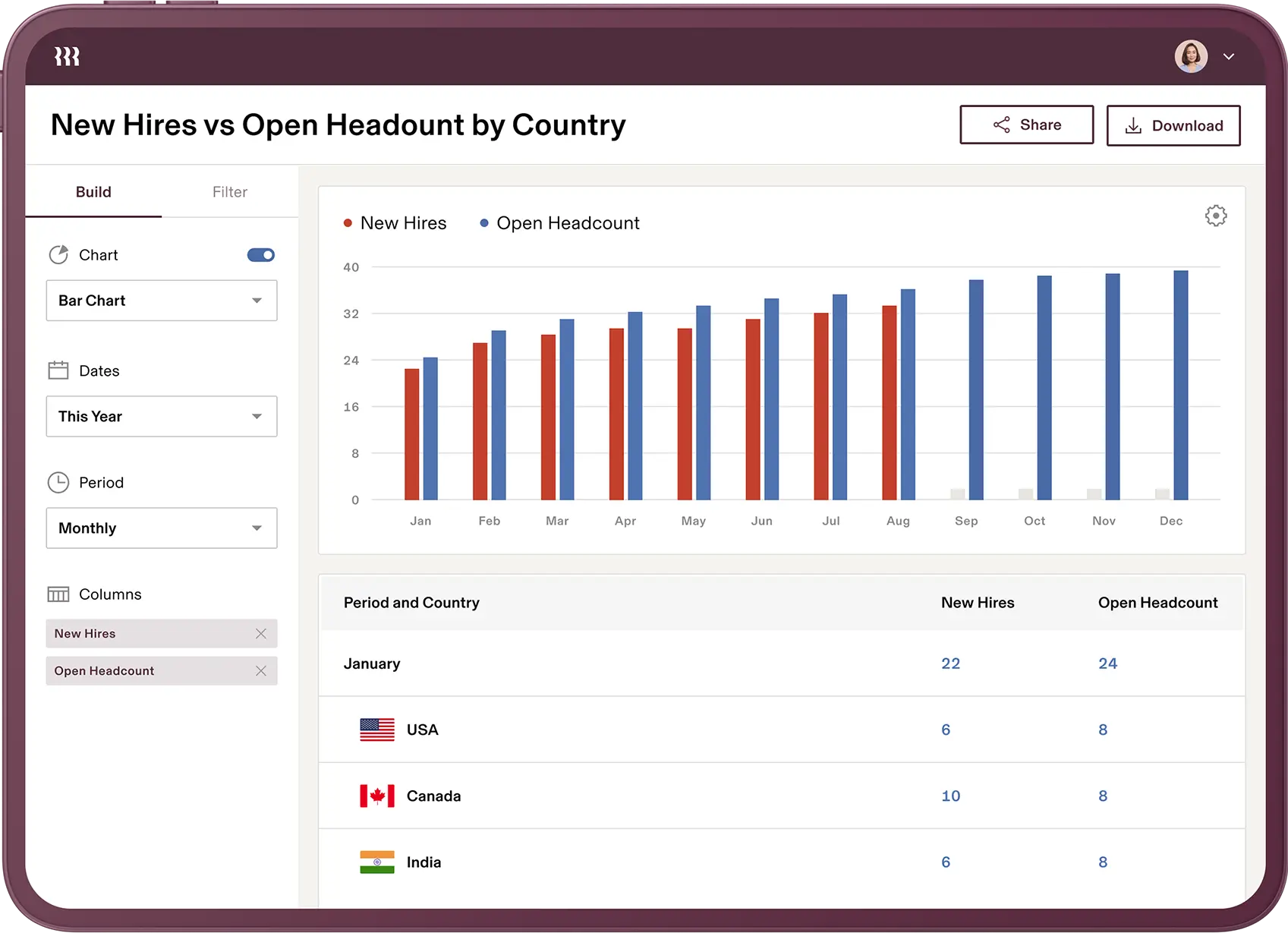
- Total buy-in to Rippling is essential
- Very SMB-oriented, in case you’re a larger company.
- New features tend to be buggy in ways that tech teams are not accustomed to fixing
Rippling is a popular human capital management (HCM) system that helps SMBs manage HR and IT processes in a single platform.
Rippling focuses heavily on automation tools to free HR teams from repetitive manual tasks, such as self-service onboarding and benefits enrollment. Using simple if-then statements, I can build surprisingly complex workflows, from adding non-discretionary bonuses to employee paychecks once they satisfy the necessary criteria to sending task reminders through Slack.
I even built my own workers' compensation (WC) injury workflow that sends WC tasks to an injured employee's direct manager when I enter an injury date in the employee’s profile.
While I have yet to test it, Rippling now offers tools to build your own internal app using Rippling data and automated workflows so that you can create even more individualized processes. The company also plans to release tools to make custom integrations for even more powerful data flow between applications.
This kind of customization, alongside support for increasingly complex HR needs such as global payroll, headcount planning, and employee travel management, makes Rippling the best option for fast-growing companies. All of Rippling's products operate on the same platform, meaning you retain access to your employee data regardless of whether you grow, shrink, add new locations, or acquire new ones.
Rippling serves more than 20,000 companies, including Blaze Pizza, Taskrabbit, Anthropic, and Forbes Advisor.
All customers must purchase Rippling’s base platform, Rippling Platform, which starts at $40 plus $8 PEPM. You can then add on modules from the following suites:
- HCM: HR modules including U.S. and global payroll, benefits administration, time and attendance, performance management, scheduling, chat, and recruiting.
- IT: IT modules including identity and access, device, and inventory management.
- Spend: Finance modules including corporate cards, bill pay, and expense management.





Best For
Rippling works best for fast-growing SMBs looking to manage HR, IT, and payroll in one place.

We used Rippling as the source of truth for all HR reporting and documentation. The prior system we used did not have the storage and reporting capabilities to be our source of truth.
The key workflows we used were onboarding, offboarding, and document signature and retention. We were able to get most of the functionality we needed for these processes, but there were a few things that didn't work the way we needed them to without buying additional workflows.
There were some basic workflows, which were unlimited and free, but there were others that required upgrades and extra charges. The core plan included one workflow, so if you needed more than that, you had to purchase additional or upgrade your plan. The way that we set up our onboarding workflow (which was specific to location), we needed several workflows to accommodate our different locations, which was not a cost-feasible upgrade. Also, if you change the trigger on the free workflow, it changes to an upgraded workflow.

Rippling is user-friendly; you do not need to be a programmer to be able to program functions on this platform. You can contribute ideas for new features or functionality. Their customer service is better than most HRIS systems.
The organization had been using an HRIS system that did not have the robust reporting, automations, or customer service they were looking for. I used Rippling with the company for about a year and a half as a super admin. We found Rippling's customer service superior to the previous system we had been using.
Implementation was easy, but I strongly recommend that someone who has done implementations previously spearhead an implementation to help bridge where you were with a previous system to where you want to go with Rippling. Setting up workflows and automations is easy in Rippling, and their technical advisors are always willing to hop on a call to walk you through any issues that you may need additional help with.
We started using Rippling as the HRIS/payroll for our US team but quickly added the Canadian team. We used it largely for headcount and reporting for all other global teams.
Only one workflow in the core plan; everything else is an upgrade. Rippling often uses their customers for BETA testing without letting them know (Rippling told us they had functionality for payroll in another country when they did NOT). It feels like they are constantly trying to upsell you and get more money out of you.
The tool is one of my favorites so far. It is very easy to use, but when you get stuck on something, they will provide live support to walk you through. Most other HRIS systems are very helpful through implementation but are hard to reach once you have completed.
People need to think about the implementation process; the new tool is probably not going to look or act like the old tool. Definitely ask if there is a demo account and work through it to see how it works.
Think about where your company is now versus where you expect to be in five years. Will the tool grow with you? How much additional expenditure will be required to scale it with your business? If there are new functions you will need to purchase in the future, will the additional expense work with your scaling budget?
Rippling is very good at taking requests from customers for new functionality. For the most part, Rippling employees only know Rippling; they don't know other platforms. So they don't know how you used XYZ brand prior and how the change in process affected your business.
Rippling is good for organizations with a growing or evolving workforce. It can house all historical HR documents, send revised documents out with the click of a button, and update workflows easily.
Rippling would not be a good fit for a small, cost-conscious organization that doesn't need all the functionality it provides or would have to pay substantially more for the add-ons.
Paycor
Paycor is a robust mid-market HR software for leaders at U.S.-based companies who want to save their teams time during payroll processing. In particular, their pay grid interface is great if you're looking for a more hands-on payroll experience that allows you to complete it faster (sometimes in just three clicks) and manage pay runs for multiple locations or pay schedules in one place.
PROS
- Payroll services: Offers check stuffing and delivery, garnishment services, payroll auto-run, employee paycards, and on-demand pay — handy for companies with frontline teams.
- Financial wellness tools: Provides employees with earned wage access, budgeting tools, and financial learning and counseling options to improve spending and saving habits.
- Frontline worker support: Advanced time tracking (geofencing, on-premise time clocks, group punching), scheduling, and integrated workers' compensation to support frontline worker needs.
- Paycor payroll solution and mobile app are both straightforward to use.
- Intuitive self-service employee portal.
- Offers multiple modules for small businesses and custom plans for teams with 50-1000 employees.
- Unlimited payrolls.
- Offers discounts frequently. Though not listed on their site, a free trial is available to those who contact the support team directly.
- On-demand pay is available for all plans.
- With the acquisition of the people development platform Verb, it has improved its employee learning experience.
CONS
- Core HR processes are add-ons: You must pay extra to access the benefits administration, time-tracking, and scheduling modules.
- Legacy interface: The interface is dated compared to newer products, with modules outside payroll requiring more training to operate effectively.
- Expensive for small teams: The Basic plan has a higher starting price than comparable solutions like Gusto or OnPay.
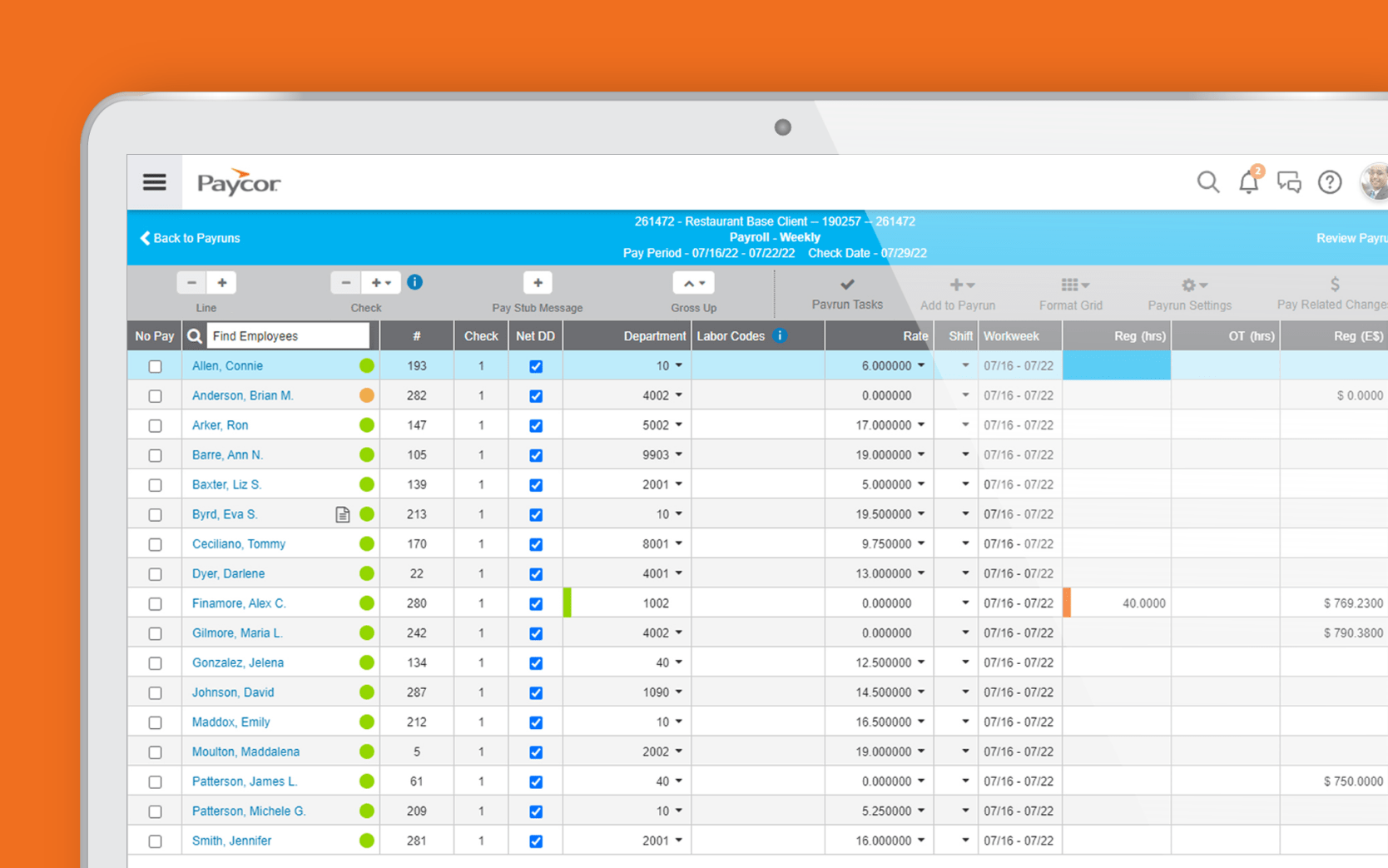
- Undisclosed pricing.
- Customer support is reported to be slow at times.
- It is not a good fit for teams with 1000+ employees or those requiring advanced customization to meet their unique requirements.
Paycor ticks all the boxes for the features we look for in HR software. The employee self-service portal is excellent; it makes tasks like reviewing or signing contracts or choosing benefits straightforward. Admin users are automatically informed about any updates to sensitive employee information.
While Paycor didn’t invent the wheel by offering mobile apps, their platform is well-built and well-liked. They make it easy to access payroll, time, attendance, and other HR features on the go.
Though large enterprises can use Paycor, its platform is best suited for SMBs to use alongside other core HR tools as they grow. Paycor offers multiple plans for companies with fewer than 50 employees, so whether you only need a payroll solution or a full HR suite, Paycor is a flexible option.
One of Paycor’s top features is its pay grid for payroll processing, which I found one of the easiest and most customizable, even compared to payroll-forward vendors like ADP and Paylocity.
True, it looks much like a fancier Excel spreadsheet, but I can get a macro view of payroll costs, along with in-app warnings, such as net pay shortfalls, to reduce the risk of errors. I can also see upcoming pay runs months in advance and make changes ahead of time, like entering year-end discretionary bonuses for the last payroll, so I don't forget them.
Despite this, Paycor’s HR modules outside of payroll lack the finesse of more modern alternatives like Rippling — mainly because Paycor adds these capabilities after company acquisitions. For example, Paycor Paths, their leadership development module, comes from their acquisition of the behavioral microlearning platform, Verb.
As a result, modules tend to have an inconsistent interface. Their performance management module, for example, is completely separate from the rest of its platform, with a new navigation panel and design compared to its payroll, benefits, and time-tracking modules. Not only does this create a disjointed experience, but it makes it harder to quickly find the information I need when moving between HR tasks.
Paycor has nearly 800,000 customers, including Wendy’s, Detroit Zoo, and the Cincinnati Bengals.
Paycor does not disclose its pricing, so you must contact its sales team for a quote. It offers two product tiers: one for small businesses with 50 or fewer employees and one for companies with 50–1000+ employees.
Within the small business product tier, you can choose from 4 subscription plans outlined below. Although not currently listed on its site, Paycor’s starter plan, Basic, used to cost $99 + $6 PEPM to give you an idea of costs.*
- Basic: Basic multi-state payroll and tax compliance.*
- Essential: Everything in Basic plus reporting, analytics, onboarding, PTO management, and basic recruiting.
- COR: Everything in Essential plus HR support center, 1:1 HR guidance, and expense management.
- Complete + ASO: Everything in COR plus advanced analytics, 401(k) plan administration, employee assistance program (EAP), and dedicated HR partner.
- Add-ons: Workers’ compensation, time and scheduling, benefits administration, and advanced recruiting.
* New Basic, Essential, Cor, and Complete + ASO plan customers get 50% off for the first 6 months.
As of April 2025, the payroll titan Paychex acquired Paycor. Paycor's platform and services haven't changed as of this writing, but Paychex does plan to expand its service offerings to Paycor customers, too.





Best For
Paycor is best for U.S. companies with up to 1,000 employees who need advanced payroll support to manage the complex needs of their frontline workforce.

I use Paycor daily when we are actively looking to fill a role. The key workflows I use it for include posting job descriptions. Paycor automatically posts job descriptions on the free versions of select job sites, such as LinkedIn and Indeed, and on our company website via a widget.
We use Paycor’s minimum qualification questions to screen candidates, track candidates through the pipeline, schedule follow-up reminders, and communicate with applicants using customized email and text templates.
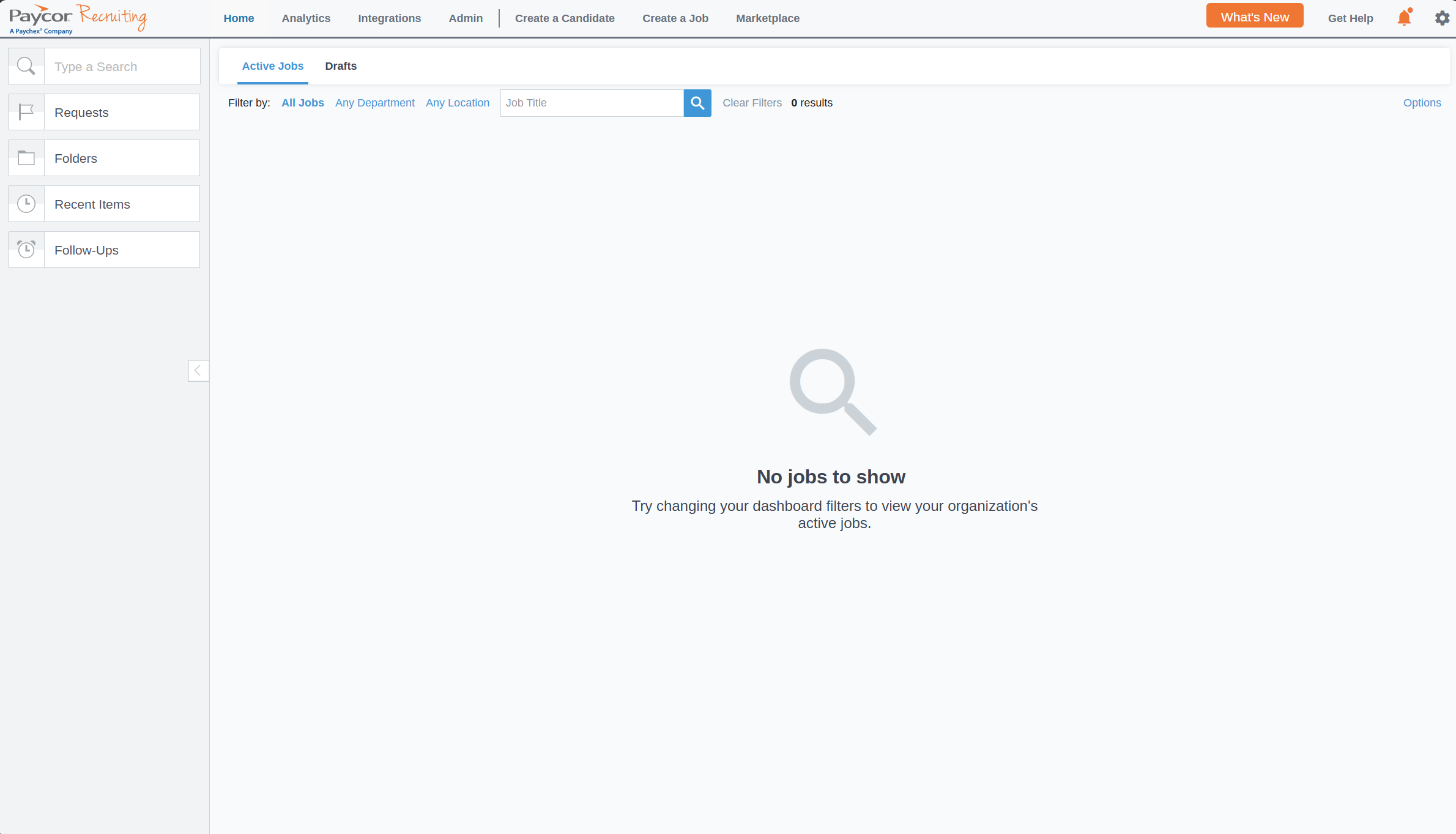
Automatic publishing and removal of job postings across multiple platforms simultaneously with one click.
Emailing and texting applicants using customized templates via Paycor, with the option to schedule sending emails and texts.
Tracking applicants through the pipeline and the ability to set reminders to monitor and follow up with applicants.
Paycor and Paycor Recruiting were subscribed to by my client prior to my being hired. The HR Manager uses Paycor's core module, and I primarily use Paycor's Recruiting module. I have been using Paycor Recruiting for over 18 months and primarily use it to post job openings, automatically filter applicants using screening questions, and track and communicate with applicants through the pipeline.
Limited ability to customize the pipeline stages to align with our workflow.
No ability to bulk download applicant resumes for offline viewing.
Limited ability to customize visualizations within the app, so we must export the data and develop visualizations using third-party tools such as Power BI.
I have limited experience with their competitors.
I would recommend thinking about your organization's workflow and how customizable the tool is, i.e., whether you can customize the tool to align with your organization's workflow (and not the other way around).
I would research the type and responsiveness of support the company offers. For example, Paycor only offers email support, and while they have been able to answer most of our questions within a few days, it would be helpful to have the option of speaking with someone on the phone.
Not to my knowledge.
I'm not sure how to best answer this question since I am not familiar with all of Paycor's services or the full range of needs across different HR teams.
An organization that needs a highly customizable solution with live, on-demand support won’t find Paycor to be the best fit.
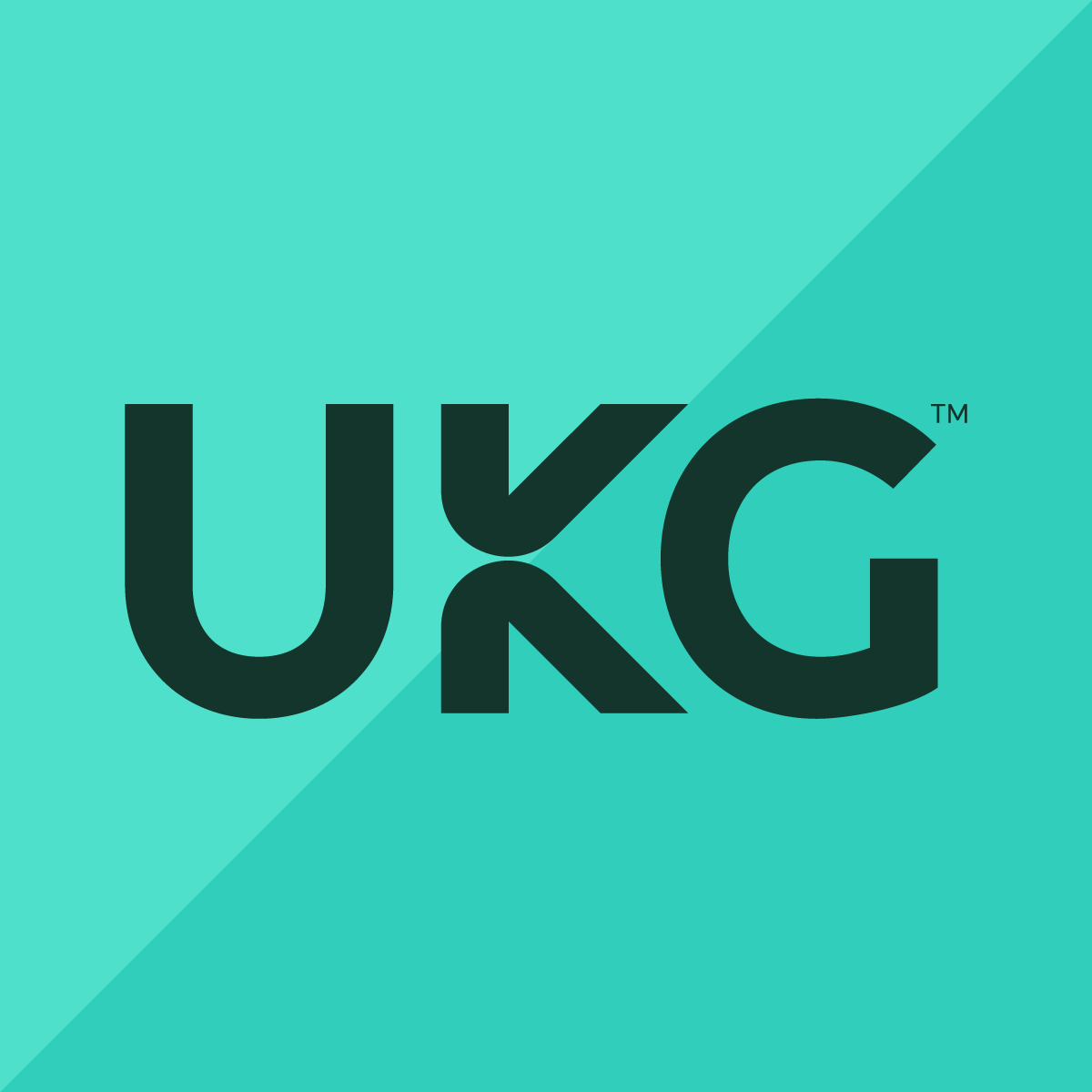
UKG

If you need detailed people reports, quick access to critical data, and customizable dashboards, UKG's HR software is for you. I picked it for its exceptional platform and HR process customization capabilities. Beyond simply adding your company logo, you can customize which modules you access from its tabs, drag and drop widgets to create your own at-a-glance dashboards, and adjust permissions to collaborate across teams with shared views.
PROS
- Advanced search and filter tools: Global search tools let you pull up saved reports or employee data across modules for quicker access to information.
- UKG Bryte AI assistant: Produce reports, automate scheduling, and address pay errors within the flow of a natural conversation to improve process efficiency.
- Industry-specific add-ons: Add specialized UKG products, such as Roster Cloud for casino resorts or TeleStaff Cloud for public safety staffing, to meet your industry’s specific needs.
- Super robust product, packing years of experience with HCM and Workforce Management technology
- Since they offer UKG Pro for HRMS and UKG Ready for workforce management, you could arrive at a combination of products that suits many of your HR needs from the same set of tools.
CONS
- Steep learning curve: Expect multiple training sessions with your staff to ensure widespread and effective platform use.
- Expensive: Modular pricing may be too costly for small teams.
- Long implementation: Plan for a setup process lasting several months if migrating to UKG.
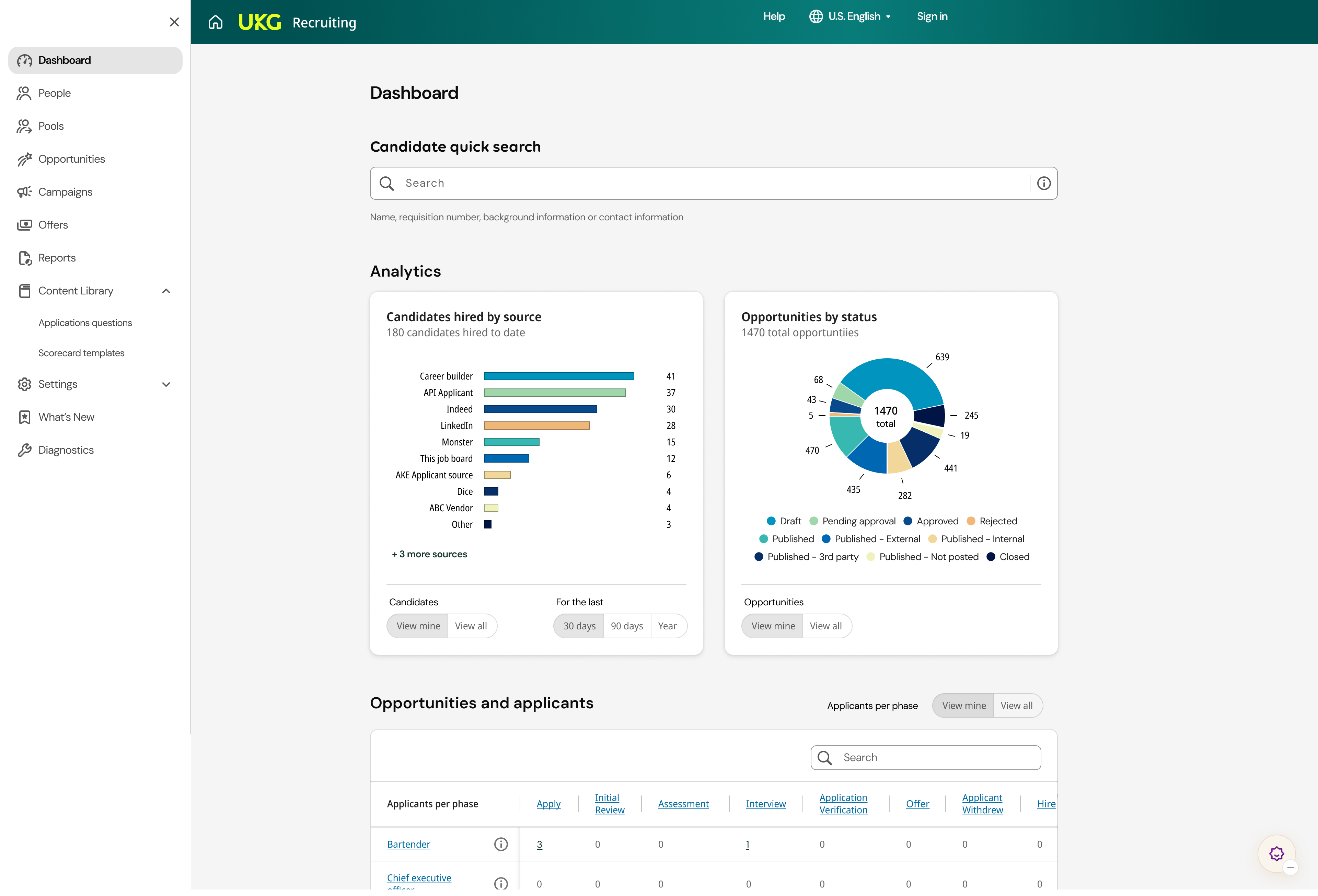
- Compared to newer tools, UKG Pro and UKG Ready tend to miss a unique selling point or a specific focus on a certain type of business. While they work great for bigger companies in all sorts of industries, very niche operations might have a hard time adapting to the tool.
- Similarly, UKG offers many solutions under one umbrella, so it's not the best fit if you're looking for only a handful of specific use cases.
UKG is the result of a merger between Ultimate Software and Kronos Incorporated. It offers two HR technology solutions: UKG Pro and UKG Ready. Here, I focus on UKG Ready, which is geared toward growing midsize businesses.
UKG is best for process-heavy HR teams that want the ability to personalize how they get HR work done. UKG accommodates different working styles by enabling complex processes that other HR platforms with predetermined workflows cannot support, such as accident reporting or succession plans. This adaptability, coupled with the reliable support from the UKG Community, is the characteristic that impressed me the most.
Speaking of, the UKG Community feature offers a massive repository of information and insights drawn from the questions and answers of other users. It also allows users to seek assistance and interact with other current platform users— extremely handy when you want to learn new capabilities or troubleshoot issues without contacting customer support.
Admin users will appreciate the fine-grained control over user access, which strengthens data security through permissions for different individuals and user groups.
Yet UKG’s high configurability and option-saturated screens make it challenging to set up properly, especially if you're migrating data and workflows to the platform. I don't recommend UKG as your first HR software solution, as new users will find it exceedingly complex. But if you're growing and need varying workflows and data reports to support multiple entities, locations, or worker types, UKG is a great option.
UKG has more than 80,000 customers, including MGM Grand, Belle Tire, and The Salvation Army.
UKG does not disclose its pricing; you must contact their sales team for a quote. Expect the quote to take into account your business size, payroll complexity, implementation support, and needed modules. Below are the modules you can choose from:
- HR and Benefits
- Payroll
- Talent
- Time and Attendance
- Scheduling.
- Culture
- Compliance
- Reporting and Analytics
- Bryte AI
- Rewards and Recognition





Best For
UKG is best for companies with 50+ employees looking to manage complicated workforce and compliance needs with customizable data reports and processes.

I use UKG daily. It serves as our ATS, onboarding, full HRIS, and payroll system. Our applicants apply on our career page, and we can process the applications, complete the offer letters, and conduct initial onboarding all within UKG. The system also functions as our timekeeping and payroll system, allowing our staff to use the mobile app to clock in and out. Their timesheets are approved in UKG and submitted to payroll for processing.

Some of the pros of UKG are that we can easily transfer information from the applicant profile to create the employee profile with no additional steps. Another pro is the ability for our employees to clock in and out easily from their mobile devices. Lastly, our benefits and payroll are also processed within UKG, making it a more convenient process for our organization.
We purchased UKG in 2019 to help streamline our hiring process, onboarding, and payroll system. Some of the benefits of UKG include being an all-in-one hiring, onboarding, and payroll system. I am one of the administrators of our UKG system, so I use it extensively. I am very proficient in what the system can offer, along with its downsides. The tool has significantly improved our operational efficiency since its implementation.
Some cons we have found with UKG include not being fully HR compliant; for a couple of years, we have not been able to properly run our EEO-1 reports. We use UKG to complete our I-9s and E-Verify, but that is not without constant issues. Some reporting capabilities hinder us from gathering information conveniently, often requiring us to manually maneuver the reports. Lastly, the system undergoes quarterly updates; however, each update often causes another issue in UKG, which we are not notified about until we submit a ticket. This causes many problems and makes us lose faith in new updates.
Many of their competitors are now all-in-one systems, so there isn't much difference in that aspect. Some improvements are needed to make it a perfect system, but the mobile ability for employees makes it very convenient for our staff to clock in and out from various work locations, differentiating it from its competitors.
The criteria that people should think about when buying this tool include the price; it is not an inexpensive tool, especially if purchasing all of the extended platform options such as the advanced scheduler and the leave or training modules. If a full HR compliance system is needed without manipulating the data, this system may be problematic.
UKG consistently updates its system to make improvements. They try to listen to their customers and work on ensuring they meet our needs.
UKG is best for an organization that needs a basic HRIS system.
UKG would not be suitable for an organization that needs to do extensive HR reporting or extensive compliance procedures.
Other HR Software Platforms Worth Considering
Several platforms didn’t quite make my top 10 list, but have unique features that cater to special business cases, making them worth mentioning. Check out my picks below:
Homebase: Best For Companies with Frontline Workers
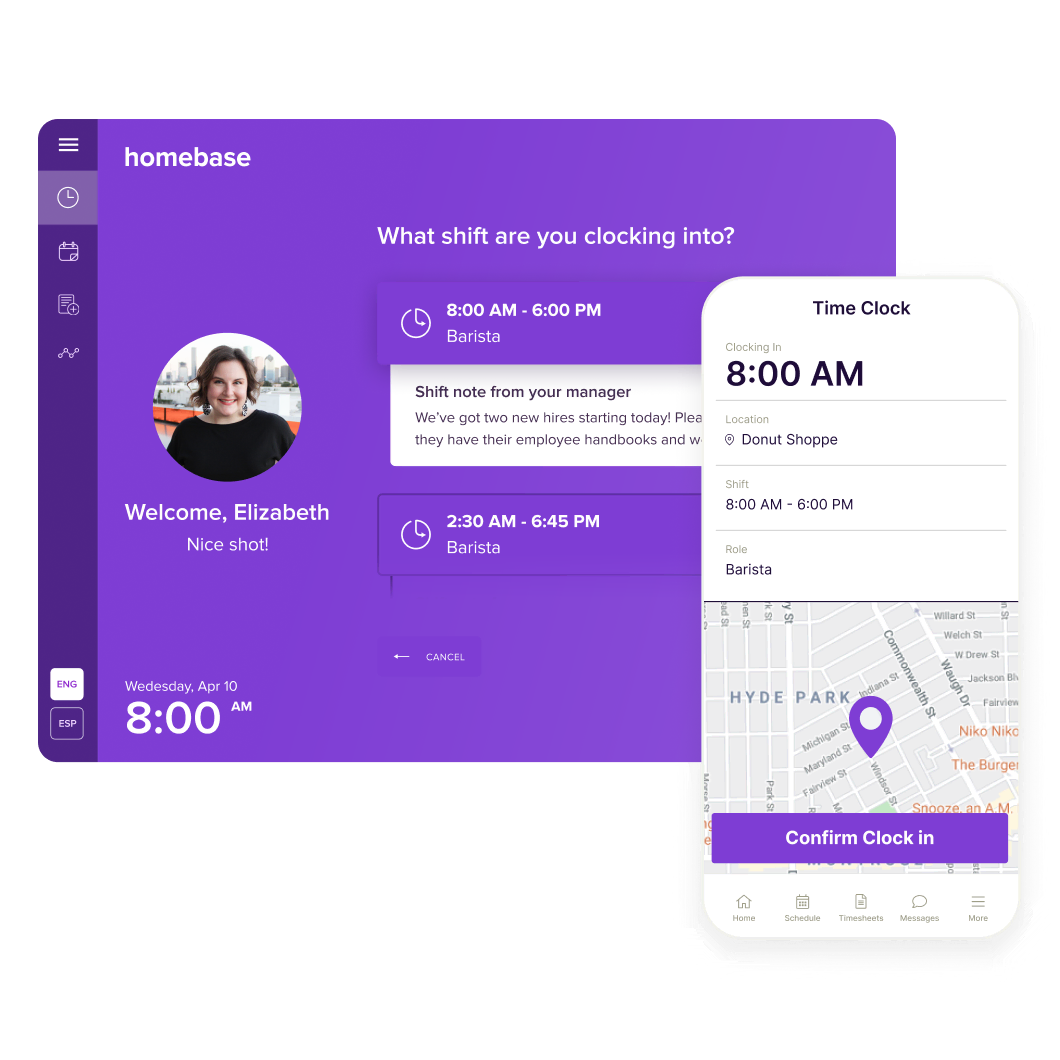
As far as small-business HR platforms go, Homebase is one of the top contenders for teams with a high percentage of frontline workers. It offers PTO management, scheduling, break waivers, and advanced time-tracking features, including photo sign-in PIN codes and geofencing to prevent buddy punching and time theft.
Since my last demo, Homebase has added AI assistants specifically designed to automate payroll, hiring, and scheduling processes. I especially liked its scheduling assistant, which saved me time by automatically generating first drafts of schedules and suggesting ways to resolve hour conflicts.
monday.com: Best For Team Collaboration
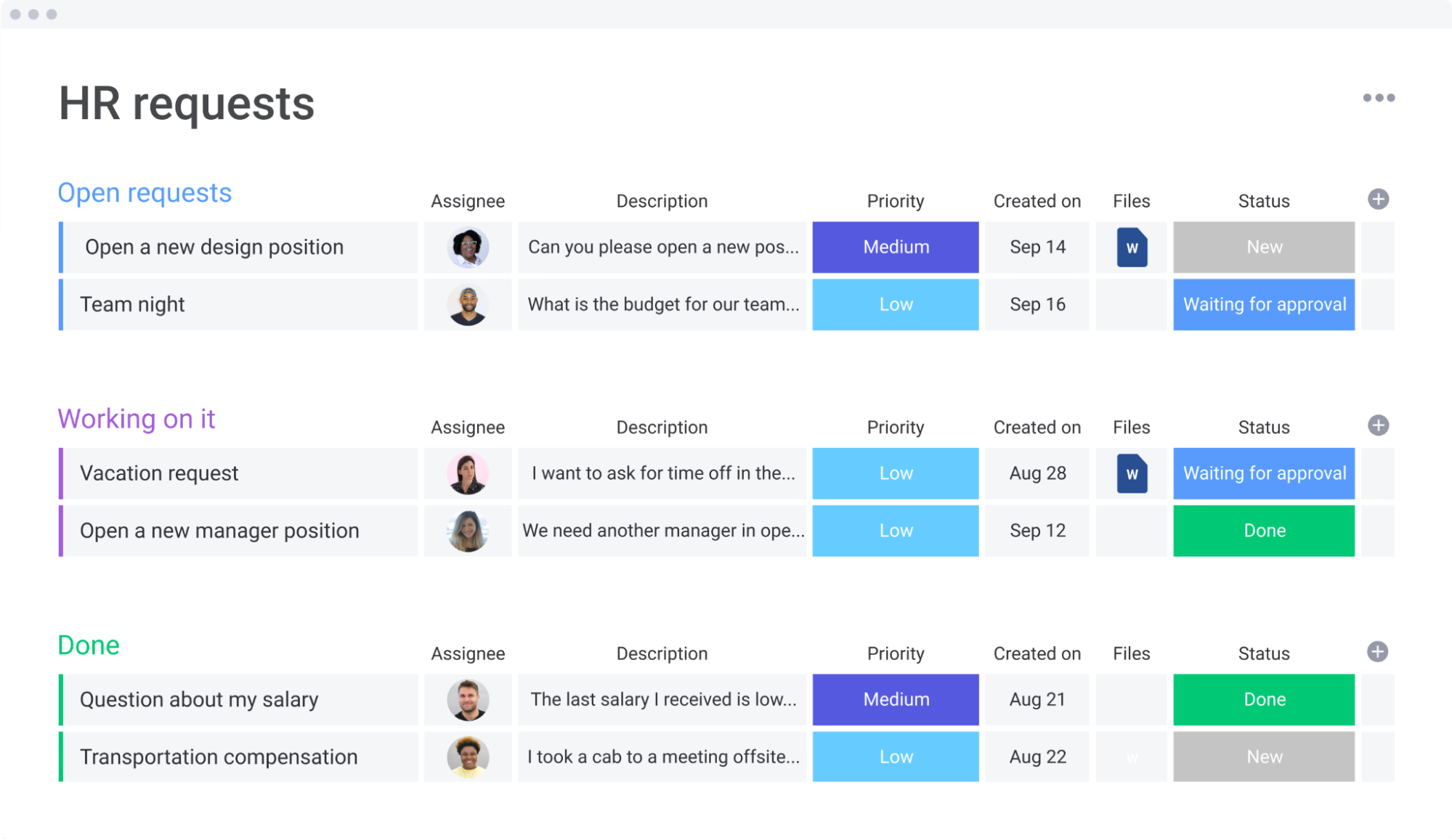
I’ll admit it: I’ve been a long-time skeptic of labeling monday.com an HR software system. As a project management platform, it lacks the built-in compliance, employee data protections, and HR-specific workflows you’d expect from comprehensive HR software suites.
But I can’t deny how powerful monday.com is for HR process management. I’ve used it for employee onboarding and managing HR documents. I can trigger onboarding tasks automatically based on a new hire’s role, level, or department, with assignments as detailed as mandatory training courses or manager-reviewed first projects.
The platform also offers HR templates for recruiting, performance reviews, and employee development, plus configurable, real-time report dashboards that rival platforms like Rippling.
I recommend monday.com for teams that need advanced automations and flexible workflows for HR tasks that require a lot of collaboration. Budget-strapped or one-person HR departments may also find it useful to manage their personnel database. Still, because it lacks native payroll, benefits, and compliance features, it works best as a supplemental HR tool and not your primary HR system.
Remote: Best For Global Recruitment
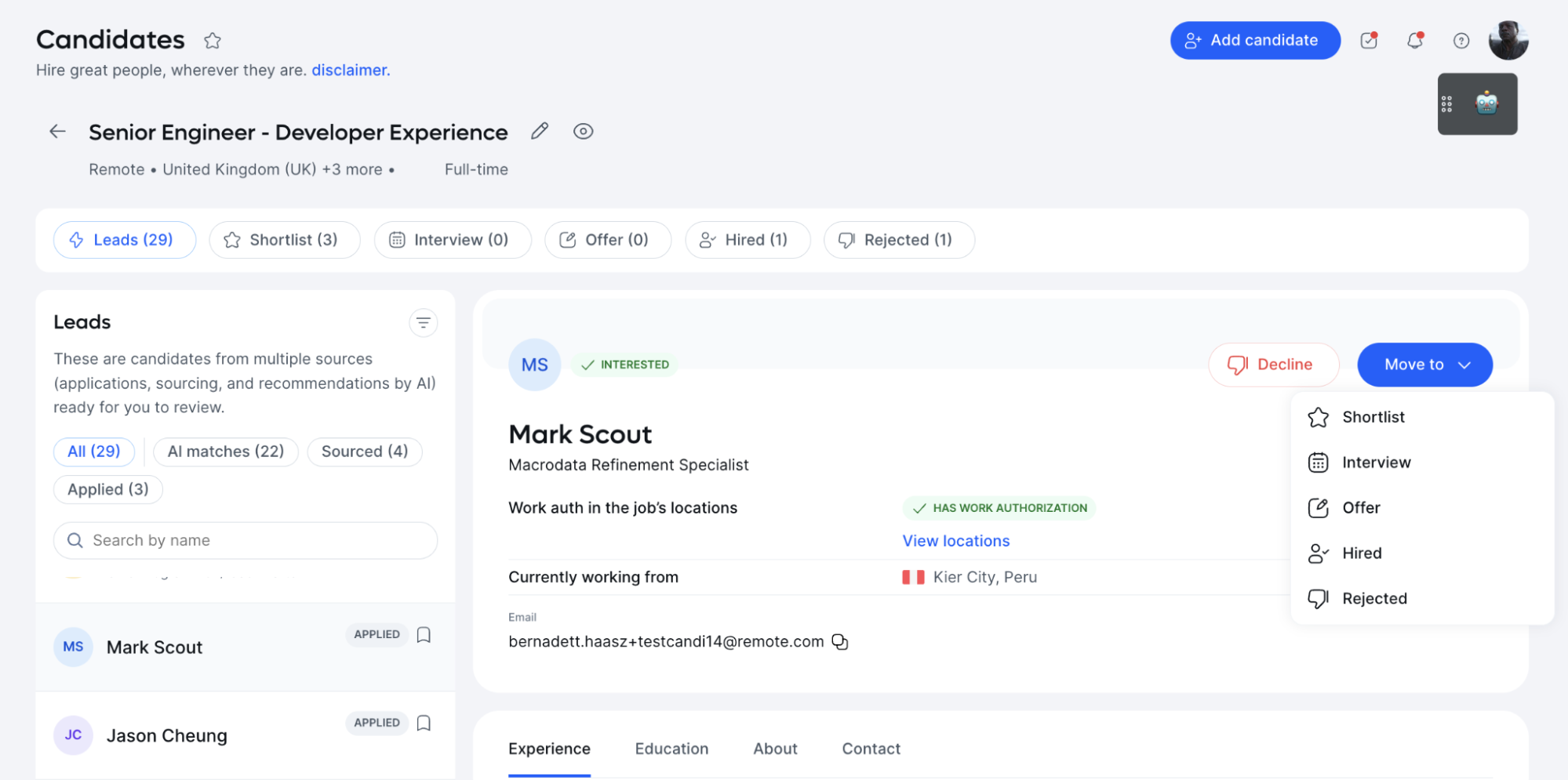
Remote is another global payroll provider platform for hiring and paying teams in more than 90 countries. While it doesn’t support nearly as many countries as Deel, I find Remote’s core HRIS much easier to navigate, thanks to its side navigation panel.
Remote’s recruiting function is particularly powerful, giving you the reins to handle global recruitment functions yourself, with access to 800 million candidate profiles, AI-powered job matching, and a mini applicant tracking system (ATS).
Does Your Company Actually Need HR Software?
While tiny businesses may be able to handle all of their employee information in spreadsheets, purpose-built HR software becomes increasingly essential as your business grows. If you’re still not sure if HR software is right for your business, here are some key signs that you should be thinking about implementing one:
- You Have More than 25 Employees: While 25 employees is not a rigid threshold (a startup with under 20 employees can still benefit from HR tools), it is an excellent place to start thinking about using an HR software system. With more than 25 employees, keeping track of data becomes a chore, and at a certain point, it becomes impractical (and error-prone!) to manually enter and update all employee data.
- Many of Your Jobs Require Licensing or Certification: If you are in an industry where employees require up-to-date certifications for legal reasons, staying on top of the schedule is critical. HR software can streamline the process by setting up automated reminders when certificates are due to expire.
- You’re Growing Fast: Companies face changing legal requirements as they pass different size thresholds. Keeping up with the legal requirements of a growing company is much easier to do automatically with HR software than by hand in spreadsheets.
- You Want Your HR Team to Play a More Strategic Role: Having one easily searchable system that stores employee information, runs payroll, and handles benefits saves a lot of time for your HR team. It allows them to focus on more strategic projects for your business, like increasing employee engagement and retention or improving organizational culture.
- You Manage Hourly Employees: With hourly employees, you often have to track hours and manage changing schedules. This is another process that is made infinitely easier with HR software.
- You Need Custom Workforce Data Reports: As businesses become increasingly data-driven, accurate and readily available people analytics becomes more and more critical. Many HR software solutions have features that enable you to hone in on data-driven recruitment and gain better ideas of your company's health.
Key Benefits of HR Software
At SelectSoftware Reviews, we like to start with the “why?” behind any piece of software. With HR software, many assume that the answer is simple: it’s a must-have because a database that tracks your employee information is necessary.
In fact, buying an HR software is not the no-brainer choice it’s made out to be. It is a major strategic decision that requires a lot of time, thought, and buy-in, and in some cases, it’s just not the right tool for the job. However, I’ve seen HR software systems offer tremendous benefits when they are adopted at the right place and time. Here are the key ones:
Save Time with Automation
By automating recurring tasks like benefits, payroll administration, new employee orientation, time tracking, and attendance management, HR software with a core human resources information system (HRIS) helps make tedious HR processes quick, simple, and less prone to error.
According to Nucleus research, companies that do use HR automation reported 67% faster new hire onboarding and 90% more time savings on admin work.
Improve the Employee Experience
HR software doesn’t just benefit your business and bottom line. It’s also a direct asset for your employees. With a user-friendly employee portal, your employees can navigate benefits options easily, review and update personal information, manage requests for time off, and much more.
Employees who feel their employers’s onboarding software is effective are five times more likely to report high levels of engagement.
Employee Performance
Beyond simply reviewing conduct and achievements, your HR system can drive employee performance.
Performance reviews, engagement surveys, performance management capabilities, and customizable integrations with other tools can all be used to build culture and turn company values from ideas to action. Statistically, 72% of HR generalists engaging in self-service HR software reported a lighter workload.
Increase Compliance
If you are careful with the setup and initial data entry, HR software can significantly improve your business’ data accuracy and accessibility.
In addition to helping out in a pinch, data accuracy, and task automation support compliance year-round. Automation results in fewer human errors. Many vendors do a great job of staying on top of changes in laws and regulations, keeping you in the loop, and updating their products accordingly.
Better Organization
If a team’s starting point is pencil and paper, using an HR system will alleviate some data security risks and the hassle of sifting through physical files. For teams who have moved beyond the paper files to a patchwork of spreadsheets and other tools, buying a complete HR suite will help keep everything in the same place.
Stacey Richey (VP of People at Corvus Insurance, 18+ years in HR) shared her personal experience with this problem, and how an HR software platform solved it.
Early on, her company used multiple tools for people processes: one tool for payroll, one for employee perks and benefits, one for talent development, one for performance management, etc. Does this sound familiar? She knew it was time for an all-in-one HR software system. First, she identified the needed features and set her team off with a headstart and a list of non-negotiables.
The result: they identified the right tool for the right price, and today, they save hours each month by not having to switch from one app to another, build integrations, or transfer info.
Streamline the Hiring Process
Some HR software tools can also act as lightweight applicant tracking systems (ATS), and some have a full-fledged ATS built-in.
These features allow you to easily collect resumes, review candidate info, and speed up employee onboarding and training, providing new hires with a seamless transition into your company. Custom workflows also help ensure the onboarding process does not overlook key steps or necessary documents.
Business Intelligence
Analyzing data metrics becomes increasingly important as your business grows. By creating custom reports, your HR software system makes it easy for your HR team to analyze hiring costs, calculate turnover, and employee engagement, and ultimately use data to help inform business decisions.
Workforce Management
The top HR software platforms come from best-in-class HR technology companies. Progressive, forward-thinking HR departments can count on comprehensive HRIS, HCM, or HRMS (human resource management software) platforms for complete workforce management.
For example, employee engagement is sometimes built right into HRIS or HCM systems, along with intuitive employee onboarding, easy-to-access payroll and benefits, mobile first-time and attendance, and payroll management. This is done through a cloud-based service that automatically updates as new modules roll out.
Common Pitfalls When Buying and Using HR Software
Making mistakes is a great way to learn, but with this complex and expensive software, sometimes it’s best to learn from the missteps of others.
The best way to avoid buying the wrong HR software system is to ask the right questions. Keep this in mind as you start working with vendors — check out my suggested questions below, and take note of these shortcomings that are typical traits of bad HR software.
Lack of Employee Self-Service
If your HR software doesn’t allow employees to update their personal information or choose their own benefits plans, then it’s not saving your human resources team time. The tools that offer the greatest returns always include employee self-service capabilities.
Inability to integrate with other systems: If you want to save time with HR software, make sure it integrates with your current tech stack. Manually transferring data from one system to another is the exact opposite of saving time.
Take, for example, the integration of a standalone ATS. Though there are some exceptions, most HR software platforms don’t include an ATS that is sophisticated for high-volume hiring. Remember this as you shop: chances are good that your ATS and HR software system will be neighbors but not roommates. You can ensure they get along if you think ahead about integrations.
Lack of Data Accuracy
Your HR software is only as good as the data it stores. A system full of inaccurate data is useless and potentially hazardous, so make sure your HR system takes measures to ensure accuracy. This applies to data entered manually or via API from another HR software or recruiting solution — be sure that your HR software takes this step seriously.
Lack of Consideration of the Application’s Limits
The right HR software for a small business and/or a startup is not the right HR software for a 1000-employee company. Your company’s current size must be a major factor in your decision, and if your business is growing fast, you’ll want an HR system that can grow with it.
For very large teams, the options are relatively limited compared to what is available for small groups. This owes to the fact that the latest and greatest tech often comes from small, boundary-breaking startups that are too curious (and sometimes distractible) to focus on making incremental improvements to the feature set needed by enterprise-size organizations.
Incorrect or Rushed Implementation
Take your time. There are few things worse than technical debt, one of which is technical debt that results from preventable mistakes.
Do not rush the data transfer process when setting up a new HR software platform. If you cut corners, data will likely be entered or transferred incorrectly. Without a doubt, you will meet that data again during a frustrating and preventable moment when you discover you’ve entered the wrong pay rate or manager permissions.
It’s advisable to get a consultant if you can afford it. Someone who “has been there, done that” when transitioning data from one system to another can be advantageous. And, of course, if your new HR software comes with a ton of vendor support, use it all! Many companies offer tremendous support to their new clients to ensure a smooth implementation of their platform.
Non-user-Friendly Platform
HR software is only effective if employees actually use it. A poorly designed platform may generate net-negative productivity and net-positive frustration. Make sure your new system is designed for the humans who will use it: it must be easy on the eyes with good UX in all environments in which it will be used, whether an app, browser, or mobile web.
Insufficient Data Security
It will surprise nobody to read that a data breach on an HR software system is very, very bad. These platforms store scads of sensitive, personal employee information, so even a minor instance of compromised security could cause irreparable damage to your business.
Be cautious and methodical when setting up your system’s security measures — and remember the sometimes blurry difference between your HR pros and your IT pros. And one rule of thumb: be weary of vendors with fewer than 20 employees listed on LinkedIn.
Insufficient Planning
HR teams who have not sufficiently mapped out the process of installing and introducing their HR software system will face tremendous struggles getting their solution off the ground. To prevent this, your team should create a concrete timeline that outlines each implementation phase in great detail.
Communicate with the relevant set of employees/managers at each implementation stage. Ask and expect a lot of questions, and remember: no rushing!
Having led many HR software implementations, Richey has “been there, done that''. In her experience, she found that one of the biggest mistakes companies make is purchasing a product that works only for where they are today, with little thought of where they may be in the near or distant future.
“Think of all the possible changes your company might experience in the next five years and plan for that.” She shared. “You want a system that scales with the company to ensure you won't switch HRIS for a long time.”
Key Features of HR Software
A clever way to save money on buying an HR software platform is to think about your goals and codify them into an organizer spreadsheet to make notes throughout your vetting process. It’s worth thinking through some of the key HR software features. Here are a few you’ll want to consider.
- Employee Self-Service Portal: Employee data management can be a lot of work for your HR department. The self-service function of many human resource management systems helps eliminate this challenge by enabling employees to view and edit their information, including benefits selection, time off, and more through a self-service portal.
- Time and Attendance Management: HR software simplifies tracking time off and planned and unplanned absences due to sickness, injury, maternity leave, or unauthorized leave.
- Onboarding Capability: While onboarding typically involves a lot of paperwork, with HR software, employees can complete much of the onboarding process electronically, including open enrollment. Most HR platforms even have electronic signature functionality, allowing employees to sign scanned documents that can be stored in the system.
- Custom Reporting: As HR increasingly relies on data and trends, it’s crucial to have a system that can create reports to help improve business decisions. A powerful people analytics system takes the manual labor out of preparing reports and replaces it with empirical evaluation speed, accuracy, and objectivity.
- Learning Management: Though a learning management system (LMS) may be baked into your HR software, it's much more likely that, like the ATS, you’ll use this tool as a standalone solution. Whether integrated or built-in, the LMS is critical for managing educational materials during employee onboarding and throughout the employee lifecycle.
- Employee Database: The employee database of an HR software platform allows you to store all employee records and information in a centralized location. The data is searchable, making finding details on employee salary and position, performance appraisal histories, disciplinary histories, and training records easier.
- Recruiting Functions: Many HR solutions allow you to air job postings, conduct interviews, store resumes, and transfer information when a new candidate is hired. While not all HR software systems have applicant tracking system features, they often allow native ATS integration so that you can transfer new-hire data to your system quickly and smoothly.
- Training and Development Management: Tracking employee training is essential, particularly in an industry where employees require specific certifications or licensing. HCM or HRMS platforms let you see what training employees need or want and helps you stay current on any required recertifications.
- Central Storage for Company Documents: As a centralized location for any information your employees might need, your HR software should be where employees can find HR policies, employee handbooks, emergency evacuation procedures, safety guidelines, and more.
- Benefits Administration: Your HR software should enable employees to enroll in health insurance, manage their 401(k), and track their benefits information. Many systems also offer payroll software and services to keep your employee benefits information auto-updated though often the payroll features cost extra.
- Compensation management: To reduce the risk of error when handling employee compensation, HR software systems often offer payroll and compensation management functions. This allows you to handle many forms of incentive compensation, including salaries, paid time off, overtime pay, and bonus programs automatically.
HR Software Pricing
Pricing of HR software depends on the breadth of the feature set offered and the size of your organization.
- Typically, it is charged on a per-employee/per-month basis. You can find HR software that costs you $2/employee/month and solutions that run as high as $30/employee/month (plus additional fees for payroll and benefits, as well as extra modules for hiring and onboarding).
- As with many things in life, you get what you pay for. If you just need to check the box, a cheaper solution makes sense. Suppose you want to use your HR system as a tool for increasing employee engagement, retaining employees, and generally driving business value through human capital management. In that case, you’ll have to pay for one of the better solutions.
- Some vendors will also charge ancillary fees in addition to the recurring SaaS cost. Be aware that these add-ons can add up, and realize that you can often negotiate these fees much more easily than the recurring per employee/per month cost of the cloud-based solution. Setup, consulting, support, and software fees are all fair game for negotiation.
A quick note: SelectSoftware Reviews continuously crowdsources data on HR software pricing through a survey. We do this to increase transparency and help HR teams better understand their options. It's anonymous and takes only two minutes; anyone who helps the community by filling it out will get access to the entire data set.
How to Get Buy-In for New HR Software
Any time you manage a significant purchase for your business, internal stakeholders will be watching. In fact, part of the process of buying a new HR software platform is stakeholder management. You must justify your choices from start to finish, from vendor selection to HR tech buy-in to implementation.
Generating wholehearted stakeholder buy-in is particularly important because it is crucial to maximizing the solution's value. Identify these key stakeholders early and understand how to maintain their support.
Below is a brief overview of the various important stakeholders and advice for managing each.
Company Leadership
If you want your HR software to have the best chance for success, you’ll need to get CxO buy-in and continuous support from the top leaders at your company. To accomplish this, present the business case to them and carefully lay out the ROI your new HR software will drive.
Present your implementation plan and provide them with a detailed timeline. Throughout the life of the HR software, provide leaders with updates about how the system is meeting the goals laid out for it, and how you plan to stay on track to achieve future goals.
Human Resources
The rest of your HR team is one of the biggest stakeholders involved in the implementation and must not be overlooked. A successful solution will make HR functions much easier, and a failed solution will make them much, much more difficult. It is important to use their help to get this right.
Because they will lead in handling employee questions, issues, and possibly grievances with the system, make sure your people team feels good about the selection and is properly trained to use it.
Communicate to all human resources team members how a new HR system will change some employees’ duties, especially with the automation of tasks that they previously performed manually.
Benefits Brokers
Some of the HR professionals I talked to consider it essential to involve benefits brokers in the process. First, ensuring that the HR software vendors you're considering work with the benefits carriers you currently use are vital.
If they do not, part of your implementation process will include justifying to your employees why they are being forced to make a difficult change. In some (but not all) cases, a benefits broker can help with this.
Although keeping current benefits unchanged may narrow down and simplify your search from the start, brokers can be helpful to help navigate the notoriously tricky ins and outs of benefits and coverage. Finally, some benefit brokers have an internal HR software team you can partner with during the RFP (request for proposal) process.
Operations Team
Your operations team will be involved in the budgeting, reporting, and legal compliance of your HR software. They may also communicate with benefits management providers and external partners affected by your new system. Communicating with your operations team is crucial to their continued support of your HR solution.
IT Teams
Your tech teams will play an important role in helping implement and update new software, so involve them in the decision-making process to ensure they are comfortable with the technology and any security implications.
It may also be helpful to open a communication channel between the vendor’s tech people and your IT team, so if they do run into problems, you are already one step closer to a solution. If the system will require a lot of updates, especially if they are not the automatic, cloud-based type, make sure that your tech team is aware and prepared.
Employees
Every employee has a stake in the success or failure of your HR software. A successful, easy-to-use system is a massive benefit to workers.
At the same time, the success of your HR software is dependent on your employees using it correctly, so be sure to provide the necessary training and communicate the solution clearly and early. You should listen to your employees' feedback at every step of the road and take their complaints and concerns seriously.
Be sure to carefully explain the positive ways an HR platform will impact their day-to-day work and focus specifically on how the system will benefit them now and in the future.
Questions to Ask During Demos with HR Software Companies
The next step is working with vendors and doing demos. For this step, it’s essential to come prepared with questions that address the core needs of your organization from a functional standpoint, as well as the various items internal stakeholders are looking for (security, data migration, self-service portals, etc.).
Here are questions you should have in your back pocket to ensure your company's needs are met by the tool your vendor is selling.
- How will information be exchanged with carriers (for benefits)?
- How can we put important data into this system? (API, Excel spreadsheets, documents, other databases, and paper documents)
- Does it accommodate benefits carriers’ rules?
- Does it integrate with ATS/payroll system/any other systems you might have that impact workforce management?
- What built-in security measures does it contain?
- Does this solution have SSO (single sign-on) capabilities?
- Are there multiple authorization levels for different types of users?
- Is there a maximum number of employees it will support?
- What types of reporting capabilities does it have?
- Does it include features to help HR communicate with employees, like mass emails or sophisticated message filtering?
- How much technical training will be required?
- What kinds of technical support are provided?
- What recruiting capabilities are built in?
- Which HR processes will be automated?
Richey points out, “Demoing software can be painful, but it pays to go into the weeds for every single module.” When approaching a demo, Stacey likes to get a feel for what every workflow will feel like for her employees. She believes they must be getting a tool that makes their lives easier, and often, this commitment requires a trial version to test out the software after the demo.
How to Implement an HR Software System
Here are some best practices to help you ensure a successful HR software implementation.
- Fully commit: To take full advantage of the services your HR software offers, you must fully understand all of its features and how to use them. Get your data migrated into your new system quickly (but do not rush!) and dedicate time to get used to the new processes.
- Decide on an implementation team: It’s always wise to have a team that will take full responsibility for the rollout process of the product. This team should be in charge of communicating the new HR software to staff from different areas of the company so they’re equipped to take full ownership of the implementation process.
- Concentrate on adoption: To prevent poor adoption, ensure employees are aware of the new technology before you roll it out. It’s also essential to select a user-friendly HR system and provide the necessary training so all employees, from new hires to executives, feel comfortable using the technology.
- Seek support from the vendor: It’s unrealistic to rely entirely on the vendor to fix all your problems, but they can certainly be helpful in many cases. Understand in detail the support that will be offered, and get SLAs in place if you can.
- Be able to adapt: Being adaptable is always important for an HR team in many cases, including when implementing an HR software solution. If the roll-out lacks energy or employees are responding negatively to the system, you need to be ready to change your approach to set your HR software up for success.
HR Software FAQs
What is an HRIS?
An HRIS is an employee management platform that allows HR teams to store and manage employee records. They generally include or integrate with standalone tools that offer core HR functions like payroll, performance reviews, and ATS. Almost all HR software systems have an HRIS at their center, functioning as their employee database management tool.
What does HRIS stand for?
HRIS stands for Human Resource Information System.
What does HCM stand for?
HCM stands for Human Capital Management.
What does HRMS stand for?
HRMS stands for Human Resource Management System.
What’s the difference between HRIS, HCM, and HRMS?
On the surface level, there isn’t a massive difference between HRIS, HCM, and HRMS. They are all comprehensive people management systems that help companies optimize their HR processes.
However, there can be some subtle differences between HRIS, HCM, and HRMS.
- An HRIS is an all-encompassing in-house software for managing people, procedures, and policies.
- An HCM has all the features of an HRIS but often includes talent management capabilities.
- An HRMS is an end-to-end system with all of the features of an HRIS and HCM but often includes payroll and time and labor management capabilities.
What are the different types of HR software?
There are many types of HR software, each addressing specific aspects of human resource management. While some tools do far more than what their label suggests, we group the ecosystem into the following main categories:
- HRIS/HRMS/HCM: Manages employee data, self-service portals, absence and PTO management, benefits administration, performance management, and recruitment tracking.
- ATS: Manages the recruitment process by organizing candidate information, tracking application statuses, and facilitating communication with applicants.
- Recruitment Software: Automates job postings across multiple platforms and track applicant responses, often integrating with ATS to build a pool of engaged talent and improve the candidate experience.
- Onboarding and Offboarding Software: Simplifies the integration of new employees into the organization and ensures smooth exits for departing staff.
- Learning Management System: Administers and tracks employee training programs, focusing on skills development and compliance training.
- Payroll Administration Software: Automates payroll calculations, tax compliance, and financial reporting.
- Performance Management Software: Monitors employee performance, sets objectives, and facilitates regular feedback to support development and organizational growth.
- Employee Benefits Administration Software: Manages employee benefits like health insurance and retirement plans, ensuring accurate enrollment and compliance with policies.
When should a company use an HR software system?
According to Danielle Jones (CEO of Pinnacle Consulting Services, 10+ years in business and HR), if an organization has at least one employee whose full-time job it is to manage people systems and benefits administration, then it is time to start using an HR software system.
About the Author
About Us
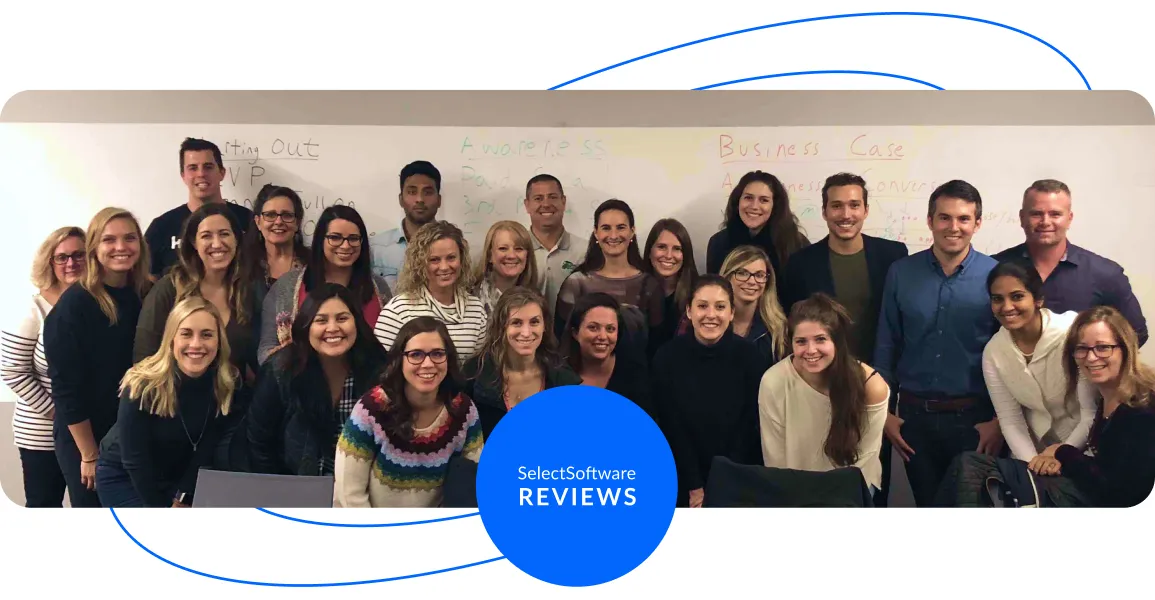
- Our goal at SSR is to help HR and recruiting teams to find and buy the right software for their needs.
- Our site is free to use as some vendors will pay us for web traffic.
- SSR lists all companies we feel are top vendors - not just those who pay us - in our comprehensive directories full of the advice needed to make the right purchase decision for your HR team.


























.png)
